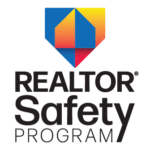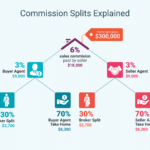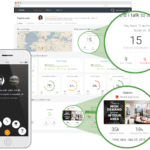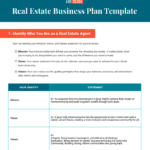kvCORE is an all-in-one website builder, CRM, lead generation, and marketing platform for real estate professionals. It’s an incredible resource for individual agents, teams, and companies wanting a robust tool to help generate leads, automate marketing, and maximize productivity. Let’s dive into my kvCORE review and explore its features, pros and cons, current kvCORE user reviews, and alternative options.
 |
|
|---|---|
| Pros | Cons |
My Verdict on kvCORE & Why You Should Trust It
As an experienced real estate writer and marketer, I’ve researched, used, and evaluated many of the best real estate CRMs. My personal review and my team’s evaluation of kvCORE come from firsthand experience, functionality, core features, comparisons to similar products on the market, and customer reviews.
The kvCORE platform stands out from other real estate marketing tools with its range of packages and product options. Its packages are designed with core features customized specifically for real estate professionals in various roles: individual agents, real estate teams, brokerages, and large companies. Plus, the add-on products add extensive functionality for specific needs like presentations, listing marketing, and agent management.
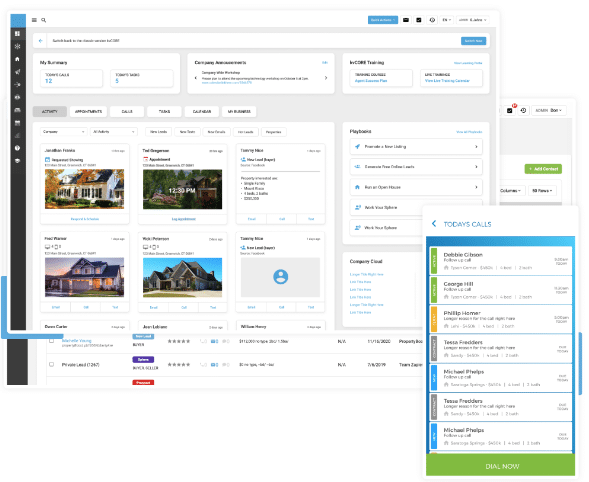
On the flip side, a few users note that kvCORE is so detailed that it can be confusing to learn and use. Ultimately, I believe kvCORE is an incredibly powerful product with the potential to grow a real estate business massively. However, it isn’t the most user-friendly product on the market, so you must plan for a learning curve before taking full advantage.
kvCORE Alternatives
kvCORE is an incredibly versatile real estate tool, but it isn’t the best fit for every real estate professional out there. Some agents and teams will want a more budget- or user-friendly option that allows them to grow with less investment of their time and money. A few of the top alternative CRMs and lead generation tools include the following:
| Platform | Why It’s a Great Alternative | Learn More | Ready to Purchase? |
|---|---|---|---|
|
No review yet | Visit Agent Fire | |
|
Real Geeks Review | Visit Real Geeks | |
|
IXACT Contact Review | Visit IXACT Contact |
| Platform | Why It’s a Great Alternative | Learn More | Ready to Purchase? |
|---|---|---|---|
|
No review yet | Visit Agent Fire | |
|
Real Geeks Review | Visit Real Geeks | |
|
IXACT Contact Review | Visit IXACT Contact |
What Current Users Think of kvCORE
Positive kvCORE reviews rave about the number of tools available to help grow your real estate business. Users also love that kvCORE helps agents increase the visibility of their property listings in front of the right market. Here are a couple of five-star reviews from G2:





kvCORE is beyond organized. Not only that, there are thousands of tools that are there to help you grow your business. I learn something new every day and am simply amazed by this platform.





It is super easy to transition to this new platform, and their back end support helps you to upload your first database. I use this CRM on the daily, and I recommend it to my entire team of 50+ realtors. The ability to organize your network, compose beautiful high quality emails, and stay on top of your touch system for your clients is top notch! I was easily able to use the system on the desktop, and the phone app is at the level of the best CRM’s that there are!
The biggest complaint from unsatisfied users involves the complexity of the product, noting that there can be a significant learning curve. A few other complaints state that the app is glitchy and is not user-friendly. Here are a few unhappy reviews from G2:



Powerful but may be too detailed for me. Just too much to handle and way too many adjustable and customizable details. Please create a Light version and ask users what they are actually using in this system.


I dislike that kvCORE autosends messages to customers. I think it the format is complicated or it just isn’t organized In a way that makes sense to me so it feels like an overwhelming system really.
Key Features of kvCORE
kvCORE includes some of the most innovative technology for real estate agents. It contains multiple lead generation methods, IDX websites, a built-in CRM, integrations with other free real estate CRM tools, and detailed insights into your overall performance. Let’s take a look at the top features of kvCORE:
Customizable IDX Websites
kvCORE offers the ability to create a fully customizable IDX website along with access to a personalized app. While building an IDX website from scratch can be complicated, kvCORE makes it easy to get it up and running without dealing with complex technology. Their IDX websites include search filters, area pages, and home valuation landing pages.

Lead Generation
kvCORE’s lead generation tools are among its best features. Along with the IDX capability, the website includes beautiful landing page templates for hyperlocal content, home valuations, and property searches. It also integrates seamlessly with social media to share your lead generation tools organically or through paid advertising like Facebook or real estate Google ads.
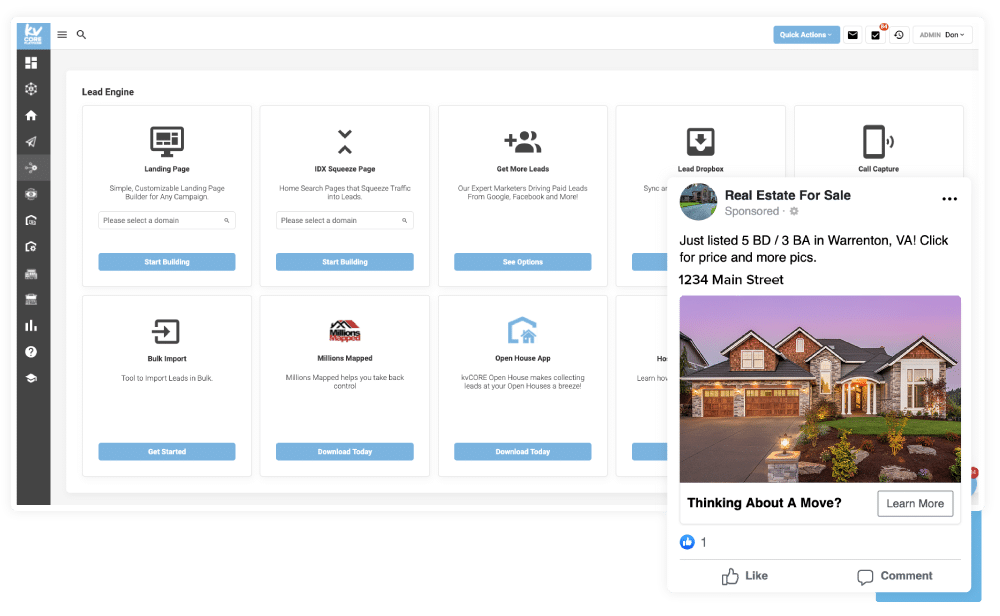
Smart CRM
The Smart CRM uses artificial intelligence to maximize the effectiveness of your marketing strategies and organize your day-to-day tasks. It monitors and evaluates your leads’ behavior to determine what each one needs to convert into a client. Plus, this real estate software automatically plans your tasks to increase your productivity to an all-time high.

Business Analytics
The detailed data and analytics dashboard is another crucial element of the kvCORE CRM. The platform gathers data on your marketing return on investment (ROI), contact engagement, and user behavior. It also generates reports on agent productivity, which is why it is one of the best real estate brokerage software choices. Plus, all of the analytics are presented on an organized dashboard.

Listing Marketing Tools
kvCORE provides a wide range of listing marketing tools in the CORE Listing Machine & Design Center. The design center includes an extensive library of templates for print and digital marketing methods like flyers, just-sold postcards, social media posts, and single-property websites. kvCORE agents can also access a branded open house app that easily captures buyer leads and sends customized nurture campaigns.

Marketplace & Integrations
Even though kvCORE already has many valuable tools, it integrates with a variety of additional tools in its integration marketplace. For instance, the Smart Assistant integrates with ChatGPT to personalize marketing and nurturing communications and increase responsiveness and efficiency.

kvCORE Pricing
kvCORE pricing is only available with a live demo since multiple options and add-on choices will affect the overall cost. However, a few online estimations range from $499–$1,800 per month. Although the packages and pricing aren’t public information, I know the kvCORE platform has packages designed specifically for the needs of agents, teams, brokerages, and enterprises.
Plus, kvCORE provides a variety of other products that are available as add-on options, which include the following:
- CORE Home: An app that uniquely nurtures the relationship between homebuyers and agents and is designed for homeowners
- CORE Present: A presentation builder to easily create customized and fully branded comparative market analyses (CMAs) and listing presentations
- CORE Listing Machine: An automated marketing and design suite designed to market listings with both digital and print strategies
- CORE BackOffice: A business management tool to manage multiple agents, transactions, and accounting
- Brokermint: A robust broker management software to help onboard agents, automate tasks, and manage transactions
- AmpStats: Real estate recruiting and retention software for growing brokerages and companies
Methodology
Here at The Close, we are a team of real estate pros tapping into our experience to bring agents and brokers accurate information about services and products on the market. Part of our methodology is to be on the reader’s side, creating content to help agents and brokers move the needle in their businesses.
Our criteria for this kvCORE review included the following:
- Pricing: Our pricing evaluation calculates monthly pricing, setup fees, subscriptions, money-back guarantees, and free trial availability.
- General Features: We evaluated each software’s main features, like IDX website builder capabilities, lead generation tools, marketing tools, and reporting and analytics.
- User Interface: We determined ease of use based on the navigation features of each software and user feedback.
- Customer Feedback: We scoured online websites to find all available third-party reviews about kvCORE.
- Customer Support: The support score is determined by the customer service hours, availability of live chats, help center, and the team’s overall responsiveness.
FAQs
What is kvCORE?
One user describes kvCORE as a “tech ecosystem” designed specifically for real estate sales professionals. Its main platform includes an IDX website, lead generation, automated marketing, and transaction management tools. It also provides customized packages for agents, teams, brokers, and companies and additional add-on tools for specific needs like professional presentations, listing marketing, and brokerage management.
Does kvCORE provide leads?
No, kvCORE does not provide actual leads and contact information. However, it includes many lead generation tools, such as custom landing pages, CMAs, listing presentations, listing marketing tools, templates for print marketing, and integrations for advertising on Google or Facebook.
Read The 9 Best Places to Buy Real Estate Leads in 2024 for more information on where you can buy leads more directly.
Who uses kvCORE?
kvCORE is best for real estate agents, teams, and brokerages that can invest in a product that provides a wide range of capabilities for lead generation, marketing, and transaction management. Although this tool isn’t the most user-friendly product on the market, agents who can invest in it can see remarkable returns on their investment.
Bottom Line: Is kvCORE Worth Your Money?
After my detailed analysis of kvCORE reviews and features, I believe this platform is a powerful tool that is likely to generate a high ROI for its users. Real estate professionals love its range of features for lead generation, nurturing, and managing transactions—it’s truly a one-stop shop for real estate lead generation and marketing. However, this platform can have a learning curve, so dedicate time to learning its functionality.
The post kvCORE Review: Pricing, Features, Pros & Cons (2024) appeared first on The Close.
Congratulations on embarking on the journey to create your own real estate business! Crafting a compelling real estate mission statement is one of the first steps in establishing a strong foundation for your personal brand, company, and team. This statement will guide your actions and communicate your brand’s purpose to all prospective clients. Let’s dive into the essentials of creating a mission statement that resonates with your value and brand.
What is a Real Estate Mission Statement?
A real estate mission statement is a concise declaration of your real estate business’ purpose, goals, and the values it upholds. It serves as a guiding light for your team and helps clients understand what your real estate business stands for. A well-crafted mission statement for real estate reflects your commitment to providing exceptional service and trust building and your desire to succeed in real estate.

In addition, your mission statement should be an integral part of your business plan. It sets the tone for your brokerage’s strategic direction and informs your business decisions. Including it in your business plan ensures that every aspect of your brokerage aligns with your core mission, which will help you stay focused on your long-term goals and maintain consistency in your operations.
Why a Mission Statement is Important for Your Real Estate Business
The real estate mission statement is important and necessary because it aligns your business with clients who share your values. It will be the foundation of your business, and you will continuously refer to that statement as the guiding force behind your business strategy and decision-making processes. A strong mission statement communicates your commitment to excellence and service, building client trust and differentiating your brokerage in a competitive market.
How To Create a Mission Statement for Real Estate
At first, creating a mission statement for your brokerage may feel daunting if you’re not great with words or as creative as other real estate professionals. Simply take some time to reflect on the points below to help guide you through crafting a mission statement for real estate agents.
Creating a realtor mission statement involves a few key steps:
- Identify your purpose: Reflect on why you started in real estate. What do you hope to achieve? What makes your business unique?
- Define your goals: Outline your primary objectives. These could include customer satisfaction, market leadership, or community impact.
- Incorporate your values: Consider the principles that prompted you to start your business. Integrity, innovation, and client focus are some examples of values.
- Keep it concise: A mission statement should be brief yet impactful. Aim for one to two sentences that convey your message.
- Seek feedback: Share your draft with trusted colleagues or mentors to get feedback. They may have a different perspective that adds to a compelling mission.
Realtor Mission Statement Examples
To inspire your real estate mission statement, we’ve compiled five real-life examples of real estate mission statements that guide the success of some top-performing brokerages. These examples highlight how a clear, concise mission can guide business strategy and communicate your commitment to your clients. Here are our top picks:

“Keller Williams ONEChicago is a real estate company with a clear mission to build careers worth having, businesses worth owning, lives worth living, experiences worth giving, and legacies worth leaving.”
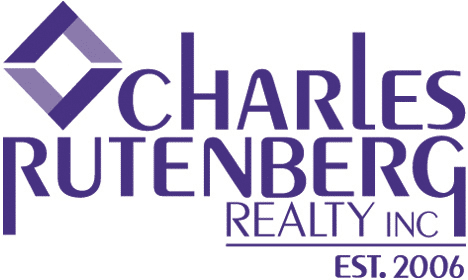
“Our mission is to provide the consumer with the highest level of service of any Real Estate company thereby ensuring that properties are sold or leased in an exemplary manner. We endeavor to deliver professional service to clients and customers so that transactions are completed to the satisfaction of all concerned.”

“We aim to delight and surprise our clients, deliver exceptional service, and exceed their expectations at every step in the transaction. Our goal is to make the real estate process memorable and one that our clients want others to experience.”

“Our mission is to provide our clients with the highest quality of brokerage services available. To bring a value-added and highly qualified team of real estate professionals to the table for all of our clients from the smallest to the largest. To provide our clients with extensive market analysis and expertise that fosters innovative solutions and rewarding real estate opportunities.”
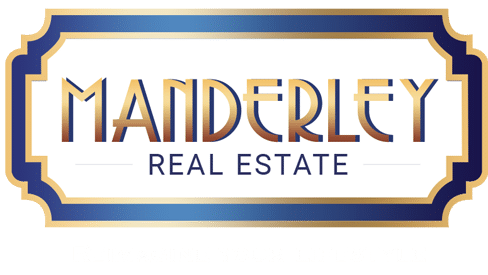
“At Manderley Real Estate, our mission is to inspire you to reimagine your lifestyle through exceptional real estate experiences. We are committed to providing innovative solutions, personalized services, and a passion for locating properties that elevate your life.”
FAQs
How long should a mission statement be?
A mission statement should be concise, typically one or two sentences. It should clearly convey your brokerage’s core purpose and values without being overly detailed or lengthy. The goal is to create a memorable and impactful statement that encapsulates the essence of your business in a few powerful words.
How often should I review my mission statement?
Regularly reviewing your mission statement is important, especially during major business milestones or market changes. This helps ensure it remains relevant and accurately represents your brokerage’s values. During strategic planning sessions, an annual mission statement review can help keep it aligned with your evolving goals and market conditions.
Where should I display my mission statement?
Your mission statement should be displayed in your business plan, on your website, in marketing materials, and within your office. Regularly referencing it in meetings and communications can reinforce your mission statement’s importance and align your team. Making your mission statement visible helps remind everyone of your brokerage’s core purpose and provides an inspiring approach to your business and client interactions.
Bringing It All Together
Creating a realtor mission statement for your brokerage is an exciting and essential step in building a successful real estate business. It defines your purpose, guides your team, and communicates your values to clients. Ensure your mission statement is ambitious and realistic to represent your real estate business. It may take some time in the beginning to create, but once it is complete, you should let it be the beacon that guides your brokerage to success!
The post Craft an Inspiring Real Estate Mission Statement appeared first on The Close.
Although most client appointments are safe, sadly, in 2023, 75,000 Realtors reported being victims of a crime. National Association of Realtors (NAR) Realtor Safety Month is vital for real estate agents to learn how to stay safe and know which tools and resources can help protect them. Read on to learn more about Realtor Safety Month and some statistics, tools, and resources you can use to stay safe year-round.
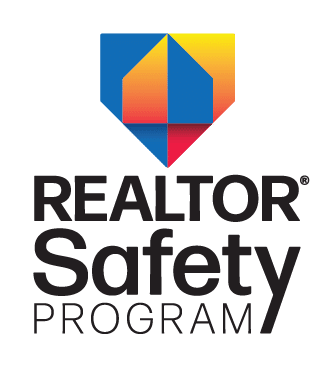
What Is Realtor Safety Month?
Realtor Safety Month is an annual event in September created by the NAR in 2003 to educate Realtors and reduce incidents within the industry. Realtor member associations, brokerages, agents, and teams can access resources to promote safety awareness. Although September is Realtor Safety Month, you can implement the strategies year-round. Learn to develop your resiliency and communication skills to handle a crisis, should it occur, by understanding how to implement safety.
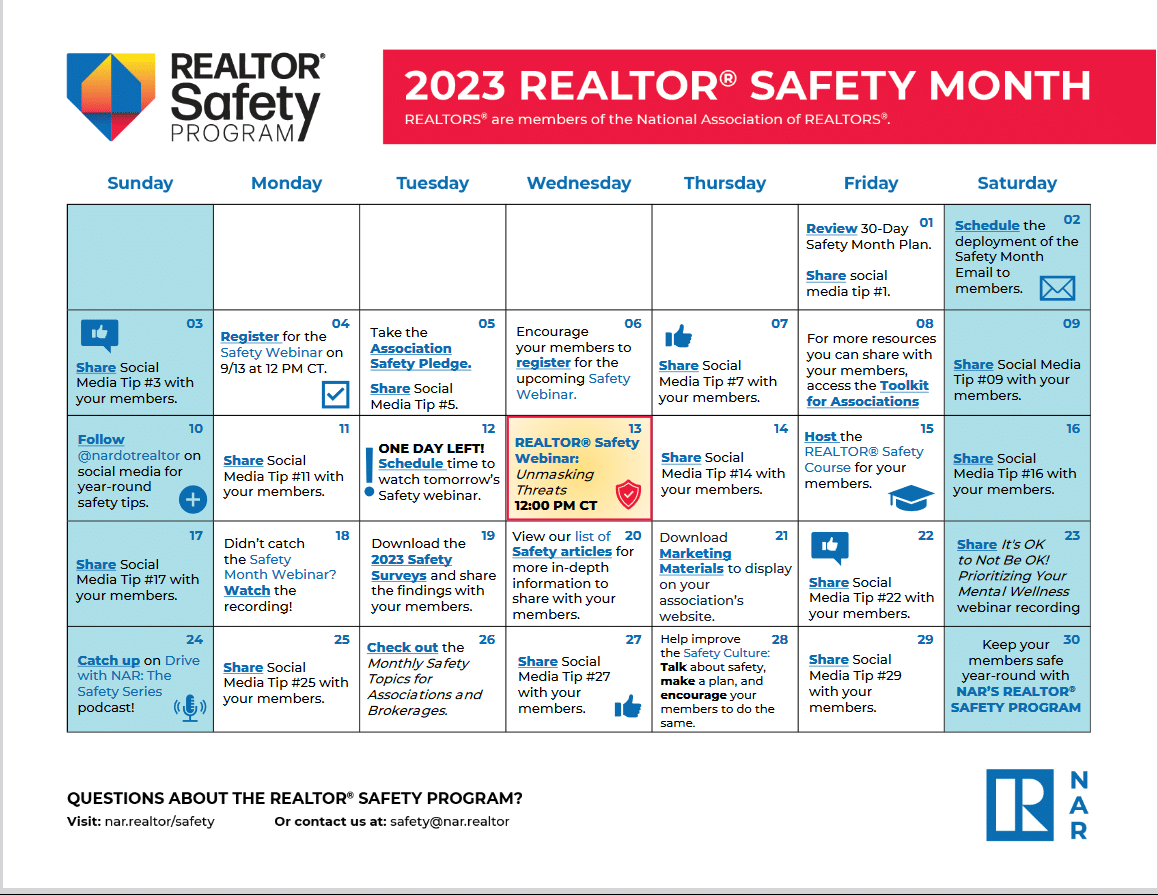
Realtor Safety Month Resources
Awareness is essential. So, I’ve compiled a list of Realtor Safety Month resources to use as a quick guide and learn more about staying safe. These resources provide education for Realtor associations, brokerages, teams, and agents. In addition to the month-long Realtor Safety events, NAR has provided a 30-day plan with materials that local Realtor associations can use to mitigate risks.
The NAR 30-day plan includes the following:
- Social media Realtor safety tips on how and what to post throughout Safety Month
- Member email to keep their members informed with engaging and timely information
- A 30-day calendar with essential best practices for each day of the month
- A two-part Realtor safety webinar to understand risks and warning signs and avoid victimization
Here are some additional real estate agent safety resources:
- Use a real estate safety app for safe showings, lockboxes, sharing location information, and quickly finding your car.
- Learn how to protect yourself and your clients from common real estate scams.
- Check out The Close contributor, Tracey “The Safety Lady” Hawkins. Her website is chock full of safety information, tools, and resources to help you plan.
- Use this wire fraud email template from NAR.
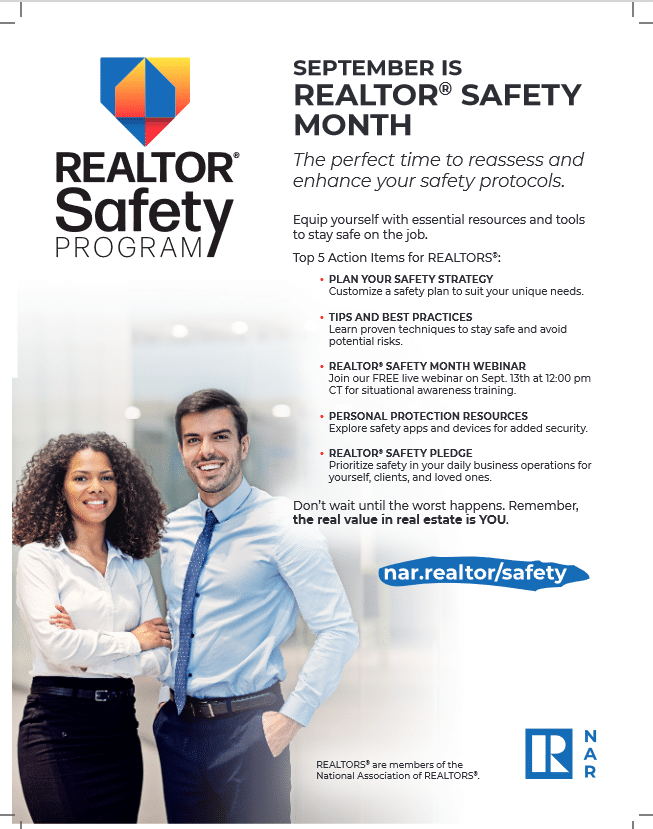
The Importance of Realtor Safety Month + Stats to Prove It
Realtor safety is important—and we can prove it! Here are some interesting realtor safety statistics illuminating the enormity of real estate agents’ risks and challenges. Use these to begin your education on real estate agent safety.
Real Estate Agent Showings
Real estate agents must plan to stay safe in open houses and showings. Check out some of these realtor safety statistics for showings and open houses.
- According to the Bureau of Labor Statistics (BLS), real estate agents’ work schedules often include evenings and weekends.
- NAR reports that 35% of Realtors who were surveyed met a new or prospective buyer or seller alone at a secluded location or property.
- In 2023, 85% showed a house alone, compared to 42% in 2022.
- NAR commercial real estate safety statistics show that the typical commercial real estate professional meets prospective clients whom they’ve never met before 59% of the time, either at their office or in a neutral location.
- Also, 18% of commercial agents surveyed said they felt unsafe hosting a showing alone.
Realtor Cyberattacks & Deepfakes With AI
Deepfakes are when a perpetrator uses artificial intelligence (AI) to impersonate someone’s appearance or voice. They’ve been used in real estate to impersonate buyers, sellers, and agents to sell a house and pocket the money without the knowledge of the party who they’re impersonating.
Real estate agents deal with sensitive information regarding people’s finances, contracts, and legal matters. Due diligence is necessary when dealing with cyberattacks, identity theft, and deepfakes using AI to trick agents and consumers. Check out some of these realtor safety statistics on deepfakes and cybersafety.
- In August 2023, MLS system provider Rapattoni was a victim of a cyberattack, causing outages across the US. Rapattoni covers 5% of real estate associations in the US, particularly those with under 10,000 members.
- There were 5.5 million reports to the US Federal Trade Commission (FTC) in 2023 for identity theft, imposter scams, and credit bureau info furnishers and report users. $10.3 billion was lost to fraud.
- According to the Identity Fraud Report from Sumsub, deepfakes increased tenfold across all industries from 2022 to 2023, including a whopping surge of 1,740% in North America.
- According to Statista, phishing scams and personal data breaches were among the most reported cybercrimes in 2022. Over 300,000 people fell victim to phishing attacks. Data breaches were another area of fraud, costing US organizations over $9 million on average as of January 2023.
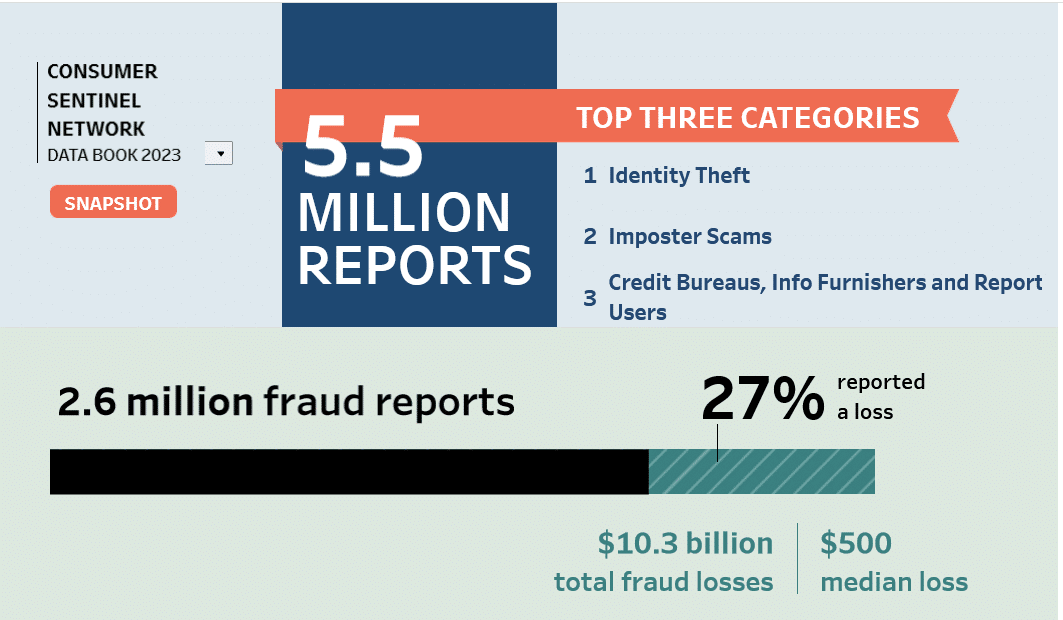
Construction & Renovation Sites
Realtors must be diligent when visiting construction sites and renovation projects since injuries can occur from falling objects or slipping. Check out these construction site stats.
- The BLS reports 1,069 fatal injuries at construction sites in 2022 and 598 in the business and professional services sectors.
- Occupational Health & Safety (OHS) reports that real estate agents face significant risks when touring construction sites or renovation projects, like injuries from slips, machinery, or falling objects.
Car Accidents
Real estate agents spend a lot of time in their cars, so they must also be mindful of road safety when driving to appointments. Avoid talking on the phone and texting while driving. Also, pay attention. Distracted driving can happen when you are lost in thought.
- In 2022, the National Highway Traffic Safety Administration reported that 3,308 people were killed and around 289,310 people were injured in automobile crashes involving distracted drivers.
- According to a study by the Centers for Disease Control and Prevention (CDC), 28% of distracted driver fatalities were between the ages of 21 and 64, so it is not just teenagers who can become distracted. However, it is more prevalent among younger people.
Men Are Vulnerable Too
While most Realtors are women (66% according to NAR), men are also at risk of assault and other dangers in the field.
- The NAR Member Safety Residential Report showed that 14% of male real estate agents said they had an encounter in which they felt threatened and unsafe.
- Residential NAR members said that they follow personal safety plans with all clients. The planning is more common among females, with 73% reporting, but 59% of males also have a safety plan that they use with their clients.
Real Estate Safety Tips
Here are some real estate agent safety tips related to the above topics that you can immediately implement.
Safety Tips for Showings & Open Houses
- Take extra precautions in locations with fewer places. Also, don’t go alone into places that are dark and vacant.
- Park on the street instead of in the driveway, where someone else’s car can block yours and prevent your escape
- Swap your favorite high heels for flats, and wear practical clothing that will make fleeing danger easier.
- Don’t enter a home’s smallest spaces, such as basements and walk-in closets, which don’t have an egress point. Instead, let your clients explore these on their own.
Cyberattacks & Deepfakes
- Use watermarks on documents and materials to guarantee authenticity.
- Use encrypted email and messaging accounts for secure messaging.
- Ask your brokerage to provide cybersecurity training.
- Trust but verify callers. Never share personal information over the phone, text, or email.
Construction Site Safety
- Wear a hard hat, safety goggles, and a reflective vest at construction sites.
- Dress for safety when showing a fixer-upper or new construction. This attire includes appropriate shoes, long pants, and nothing that could get caught onto something.
- Instruct buyers to dress appropriately when touring these sites.
- When showing raw land, wear long pants, and don’t wander off into unmarked areas. Pay attention to weather conditions before touring large parcels.
- Watch out for slick sidewalks and steps, and follow any posted warning signs.
Car Accident Safety Tips
- Set your phone to Do Not Disturb while driving. If you must take a call, find a safe place to pull over.
- Keep using hands-free or talk-to-text phone features to a minimum since it’s still easy to get distracted.
- Preview your route before traveling to a new location. Check for road work, inclement weather, and delays.
- Keep up with auto maintenance. You don’t want to get stranded!
Bringing It All Together
September is NAR Realtor Safety Awareness Month, but you should practice real estate agent safety throughout your career. Stay alert, be diligent, and use our articles and guides to stay safe. Do you have any unique strategies you’ve used to keep safe? Share in the comments below. We’d love to hear from you!
The post Realtor Safety Month: Resources for Agents & Teams appeared first on The Close.
In today’s real estate climate, agents need a personal brand more than ever. Rory Vaden said it best when he described personal branding as “the digitization of your reputation.” But how do you “digitize” the reputation you’ve built? When it comes to building your real estate brand, having experience and expertise doesn’t matter if people don’t even know you exist. Here’s the good news: I’m breaking down the exact steps you need to take to build a magnetic personal brand so you can stop chasing clients and start attracting them.
What Is Real Estate Branding & What Makes a Great Brand?
Simply put, real estate branding is the consistent techniques and strategies professionals use to market their services, build authority in the real estate space, and attract clients. As a senior brand strategist at Sell It, Owner of Elevate Design Studios, and host of the podcast Not Nice. Clever, I’ve worked with hundreds of agents nationwide and beyond on building their personal brands. My mission is to help real estate agents learn how to leverage realtor branding to create a life and business they love.
Ever wondered what makes great branding? It’s the magic that compels you to grab Kellogg’s Frosted Flakes instead of the generic store brand. Why? Because Frosted Flakes are not just cereal, “they’re grrreat!” And who told you that? Tony the Tiger, your childhood companion.
You’ve watched him on TV, sharing breakfast moments with kids ready to tackle the day. He’s dominated billboards off local highways, and when you spot him on the cereal aisle, it’s like seeing an old friend. What’s the appeal of Tony? He’s not just any tiger; he’s 6’3″ of authority and approachability, a figure both kids and the young at heart can respect and admire. Even though those generic Sugary Flakes might taste just as good, there’s a trust factor with Tony that keeps us loyal.
So what does this teach us? If you want to build a loyal following, you have to create a magnetic brand.
Elements of a Magnetic Real Estate Brand + Examples
It’s easy to think of a real estate brand as a logo or catchy tagline. While those elements may be part of your brand, they are definitely not in and of themselves your brand. There are five key elements that every real estate brand needs. Below, I’ve shared each aspect along with real estate branding examples. Use the guiding questions and the examples to begin to craft your personal brand.
You might be surprised at how much you already know about your real estate branding that you aren’t leveraging yet. While you may know these things about your brand, the bigger question is, are you sharing this with your audience in a meaningful way?
Let’s dive in.
Element 1: Your Brand Story
How did you get here? What transformation happened that has led you to this place? Why should people trust you?
Think back to before you went into real estate and reflect on the journey it took for you to get here. Maybe you were in a whole other industry, or you were drawn to real estate right out of high school. Name the reasons you entered this industry and the skills you learned before becoming a real estate agent. All these things brought you to this point, so add them to your brand story. People love to hear stories—don’t be afraid to tell them yours!
Example of a Great Brand Story
Ryan Serhant exemplifies the power of a compelling brand story. Whether you’ve followed his journey on Million Dollar Listing, dove into his insightful books like “Brand It Like Serhant,” or stumbled upon him while scrolling through Instagram, his story captivates. It’s the classic “from rags to riches” tale, resonating with many, yet remaining aspirational. Consistently sharing where he’s been AND where he’s going instills hope and motivation in his audience, ensuring his brand remains unforgettable, leaving the audience thinking: “If he can do it, I could do it too.”
Element 2: Your Brand Values
What do you stand for? What do you believe? How do you serve your clients?
Your core brand values are the business beliefs you hold near and dear to your heart and wish to instill in all your clients. Think about your brand values as the integrity and backbone of your business—things like transparency, teamwork, expertise, diversity, and quality service—the qualities you would want in a real estate agent. Write them down and prioritize the values that are most important to you.
Example of Great Brand Values
Glennda Baker, Realtor extraordinaire in Atlanta, Georgia, has built an incredible personal brand rooted in her values. Her content feels effortless to the viewer because it’s rooted in radical authenticity. Her ability to tell stories that draw you in, lean into vulnerability (have you listened to Glitter and Gay?!?), and show off her real estate prowess while maintaining her flavor of southern charm is captivating. Her brand calls in the right people for her and repels the rest. And just in case there’s any confusion … she’s been doing this since “Jesus was a baby.”
Element 3: Your Brand Attitude
Is your realtor branding humorous or proper? Playful or Zen? What’s the overall vibe?
If you’re unsure about your overall vibe, here are two things you can do.
- Send a text to six people, including two friends, two colleagues, and two past clients. Ask them to describe you in three words. See if there are any themes that you can lean into. And if you don’t like the words they chose, decide to show up differently and choose the words that resonate with who you are becoming.
- Write a list of things you’re not. Sometimes, it’s helpful to work backward. I’d likely write that I’m not stuffy or proper. Knowing what I’m not can help me hone in on what I am.
Example of a Great Brand Attitude
Shawn King, the witty Realtor from Toronto, is known for his humorous and satirical approach to real estate content. With his innovative editing style and comedic skits, he effortlessly connects with his audience, making himself instantly approachable. Shawn’s content is not just hilarious but also remarkably relatable. He possesses a knack for transforming what could easily be seen as mundane real estate topics into captivating and engaging content. With each post, he keeps his audience on their toes, leaving them eagerly anticipating his next creative twist.
Element 4: Your Unique Value Proposition
Why should people choose you over your competition? What makes you better?
This element requires you to take a good, hard look at yourself and your competitors. Other realtors can assist clients with buying and selling a property, so you need to decide what makes you unique from the other real estate agents out there. Your unique value proposition (USP) ties into your values. For example, if you value expertise, your USP could impart real estate education to your clients throughout the transaction.
Example of a Great Unique Value Proposition
Meet Marie Keaney, a SoCal Realtor with a unique twist. Formerly a teacher, Marie’s passion for education shines through in her work. That’s why she’s launched the innovative Teacher Give Back Program. When you choose to work with Marie, she donates to the teacher of her client’s choice. It’s a heartwarming initiative she showcases regularly on social media, sharing touching stories of the teachers impacted. Marie’s blend of real estate expertise and philanthropy is the defining factor that sets her real estate agent branding apart.
Element 5: Your Brand Look & Feel
What colors and fonts will you use? Is your logo modern and minimal or in your face?
While it’s tempting to pick your favorite color and fonts, it’s necessary to think outside the box to choose a color and font that will stand out visually and against competitors. Once you’ve decided on your business name, test multiple color and font options on real estate brand marketing materials to see which are visually appealing (especially from a distance). Print out competitor materials and place them next to yours to have friends and family pick the most standout look and feel to ensure it’s yours—if not, change it up!
Example of a Great Brand Look & Feel
Paige Fingerhut Charnick, the broker-owner of Beach Equities in Long Beach, CA, recognized the importance of aligning her brokerage’s visual identity with its exceptional service. Established in 1972, the brokerage underwent a logo refresh in 2014, but Paige understood it was time for a fresh update. She realized that as her brand messaging evolved, so should its appearance.
Drawing inspiration from the California coastline, Paige worked with Elevate Design Studios to curate a color palette that captures the region’s essence. With a keen eye on honoring the professional legacy of the brand, they carefully selected fonts that exude sophistication. Introducing a sun icon infused the brand with a renewed sense of vitality and energy. This transformation highlights the vital role of a visually compelling identity in ushering in a new era of an established real estate brand.

How to Build a Brand With the 3C Method
Knowing each of the elements of a real estate brand is helpful, but how do you go deeper? After working with hundreds of agents nationwide and beyond, I’ve found that you have two choices: You can build your personal brand with intention, or consumers will assign one for you.
If you’re anything like me, you would like to be in control of your future, which means you need to control your real estate branding. But where do you start? I’ve created the 3C Method to Magnetic Personal Branding to build your real estate brand, and I’m breaking it down for you here.
Before you build that website, hire a logo designer, host that next event, or write your brand story, sit down and think through the 3C Method outlined below. This is the not-so-sexy part of branding that is absolutely crucial to building a brand that actually connects.
The 3C Method to Magnetic Personal Branding
Clients
Content & Collateral
Collaborations & Features
Clients
Building your real estate brand begins with defining your target audience and intimately knowing their problems. When you’re clear about your niche audience, you can make informed decisions on how to curate your brand.
Ask yourself these questions to clarify the clients you want to work with.
Who do you work with?
- What do they want?
- What are they struggling with?
- What do they care about most?
- Demographic Information
Why are you the one for them?
- What experience(s) do you have?
- What have you been through?
- How do you serve your clients?
- What makes you special?
For instance, if you find that your passion and realtor branding resonates best with millennial first-time homebuyers, dig into that niche. Know about their fears of not being able to afford to purchase a home or save for a down payment and lean into that.
Hone in on your experience working with these individuals and answer your client’s questions before they even ask them with content that demonstrates you understand their struggles. Share stories of past clients like them. All of these things are possible when you know who you’re talking to and understand what you bring to the table.
Content & Collateral
Sharing content that documents the work you’re already doing will amplify your brand. Consistent content and marketing ideas accelerate the trust-building process with your audience and build brand awareness. Use content to share your unique approach and perspective and to craft the narrative of who you are and how you can help.
What type of Content will you create?
- IG Reels/Stories
- YouTube videos
- Podcast episodes
- TikTok videos
- Facebook posts
- LinkedIn articles
- Email newsletters
Collateral Examples
- Booklets/Brochures
- Buyer’s Guide/Seller’s Guide
- Listing checklist
- Presentations
- Flyers
Suppose your niche is working with individuals searching for 55-plus communities. In that case, you might lean more toward creating collateral like flyers and postcards than posting on platforms like TikTok and Instagram, as only 6.3% of TikTok users are 55-plus years of age. However, direct mail in this demographic shows that 50% of Boomers prefer direct mail. Once you know your first C (clients), tailoring your next C (content and collateral) becomes much easier.
Collaborations & Features
Growing your audience is key to building your brand. The fastest way to grow is by collaborating with brands with similar audiences and values. Seek out opportunities to collaborate and be featured within the industry and beyond.
How will you collaborate? Who will you collaborate with?
- Going live with others
- Podcast features
- Cross-marketing email campaigns
- Event collaborations
- Fundraiser collaborations
- Reel collaboration
Where will you be featured?
- Local news
- Online publications
- Print publications
- Blog posts
Real Estate Branding Tips
In today’s digital age, your online reputation is more crucial than ever. It’s not just about what people say about you in your community—it’s also about how you’re perceived online. Your digital footprint can make or break your real estate brand. That’s why managing and cultivating your online reputation is essential.
Here are some additional tips you should use:
- Gather your brand basics like your real estate bio, headshots, business cards, and slogan.
- Claim your profiles on relevant platforms like Google My Business, Zillow, and social media channels.
- Ensure your contact information is accurate and up to date.
- Regularly engage with your audience by responding to reviews, comments, and messages.
- Consistently share valuable content and showcase your expertise online to enhance credibility and shape your brand’s perception.
- Include your real estate agent branding ideas in a well-thought-out real estate marketing plan and budget for these items.
- (If you feel comfortable) Post personal photos or videos to accentuate your brand and show yourself outside of real estate.
By digitizing your reputation, you build trust and create a solid online presence that attracts clients and sets you apart from the competition.
Bringing It All Together
Reflection and direction are the name of the game when it comes to intentionally building your real estate brand. Remember, it’s not just about creating a logo or crafting clever slogans. It’s truly about authentically communicating who you are, what you stand for, and how you serve your community.
When you harness the power of the 3C Method to Magnetic Personal branding—clarifying your target audience, creating compelling content, and seeking strategic collaborations—you’re not just creating a brand, you’re crafting an experience that will set you apart in today’s market. So, go ahead, dive deep into your brand story, infuse it with your values, and let your unique perspective shine through.
The post Real Estate Branding: The Complete Guide for Agents appeared first on The Close.
If you’re like most agents, diving into the details of your real estate agent commission splits might not be as thrilling as closing a big sale, but getting it right can make all the difference in your paycheck. Whether you’re a seasoned pro or a newcomer hustling to make your mark, understanding how your hard-earned cash is divided between you and your broker is crucial. So, let’s break down the nuts and bolts of real estate commission splits.
How Is the Real Estate Commission Split?
Real estate commission is a key real estate term that refers to the fee paid to real estate agents for their services in facilitating the sale or lease of a property. Commissions are typically an agent’s primary source of income and are earned through the sale, purchase, or leasing of properties.
Commission split between agents in the transaction: The total commission is usually a percentage of the sale price or rental fee, agreed upon in the listing agreement between the seller or landlord and the listing broker. This percentage can vary significantly based on location, property type, market conditions, and the type of transaction, usually ranging from 2% to 6% for sales and often one month’s rent for leases. The commission split agreement between agents varies depending on the listing agent’s agreement with the seller.
Example calculation:
Sale price of the home: $500,000 Total commission rate: 6%
Step 1: Calculate the total commission
Total Commission = Sale Price x Commission Rate
Total Commission = $500,000 x 6% = $30,000
Step 2: Divide the commission between the listing and the buyer agents
Assume the commission is split equally between the listing agent and the buyer’s agent.
Commission per Agent = $30,000 / 2 = $15,000
Commission split with brokerage after the transaction: After this initial commission split agreement between buyer and seller agents of the total commission, each agent further divides their share of the commission with their respective brokerages. This real estate agent commission split with brokers will occur according to their contract terms. These brokerage splits can also vary widely and are influenced by factors such as the agent’s sales volume, experience, and negotiated terms with the brokerage.
Example calculation: Adding to the example calculation above and assuming the agent has a 70/30 split agreement with their brokerage:
Agent’s share: 70% Brokerage’s share: 30%
Step 1: Calculate agent earnings
Agent’s Earnings = Total Commission x Agent’s Share
Agent’s Earnings = $15,000 x 70% = $10,500
Step 2: Calculate brokerage earnings
Brokerage’s Earnings = Total Commission x Brokerage’s Share
Brokerage’s Earnings = $15,000 x 30% = $4,500
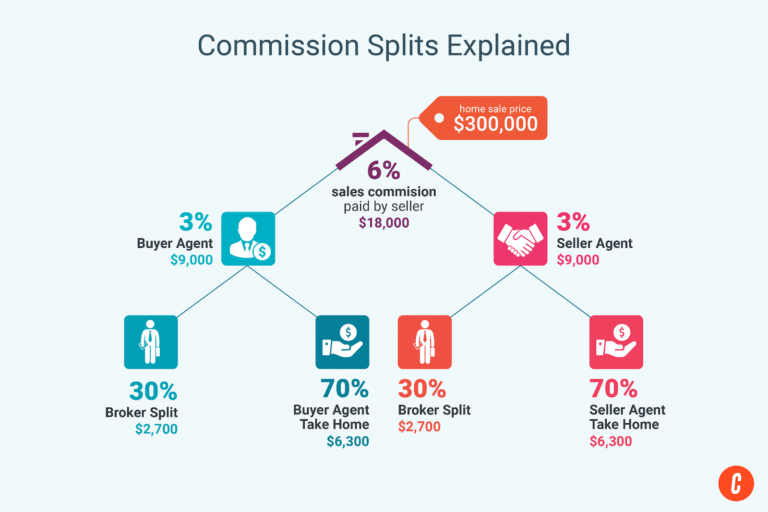
Side note: Dual agency can occur when a single agent represents the buyer and the seller in the same transaction. In such cases, the agent involved does not need to split the commission with another agent. This type of agency can increase the earnings for the agent, as they retain the full commission agreed upon in the listing agreement. However, you must disclose the dual agency to all parties. You also must have the explicit consent of both buyer and seller in writing, as it can raise concerns about conflicts of interest and the agent’s ability to negotiate fairly on behalf of both clients.
Types of Real Estate Commission Splits
Real estate agent commission splits determine how earnings from property transactions are divided between agents and their brokerages. These splits can vary significantly, reflecting different business models and individual agreements, and play a crucial role in shaping a real estate agent’s salary, financial success, and career satisfaction.
Each split model has benefits and challenges for real estate agents tailored to fit various experience levels, performance, and market conditions. Here are some common types of commission splits that agents encounter in the industry:
- Fixed percentage splits: This is one of the most straightforward models where the real estate agent and the brokerage split the commission based on a fixed percentage agreed upon in advance. Common splits include 50/50, 60/40, or 70/30, where the agent receives 60%, 70%, or more, depending on the agreement with their brokerage.
- Graduated splits: In this model, the split percentage changes based on performance criteria such as sales volume or revenue milestones. For example, an agent might start the year at a 50/50 split but could move up to 60/40 after achieving a certain level of sales, providing an incentive to exceed sales targets.
- Cap system: Some brokerages implement a cap system, requiring agents to contribute a set amount of their commissions to the brokerage until they reach a predetermined cap within a year. Once agents reach the cap, they may keep 100% of their yearly commissions. This model is particularly appealing to high-performing agents.
- 100% commission plan: Under this plan, agents pay a flat fee to their brokerage per transaction or a monthly office fee instead of splitting the commission. This structure allows agents to keep all the commissions they earn, which can be highly beneficial for agents with substantial sales volumes.
- Team splits: Agents should understand how real estate teams split commissions before agreeing to join. Often used in team settings, this split involves distributing the commission among multiple team members, including the lead agent, junior agents, and sometimes administrative staff, based on their roles and contributions to the transaction.
Who Pays the Commission?
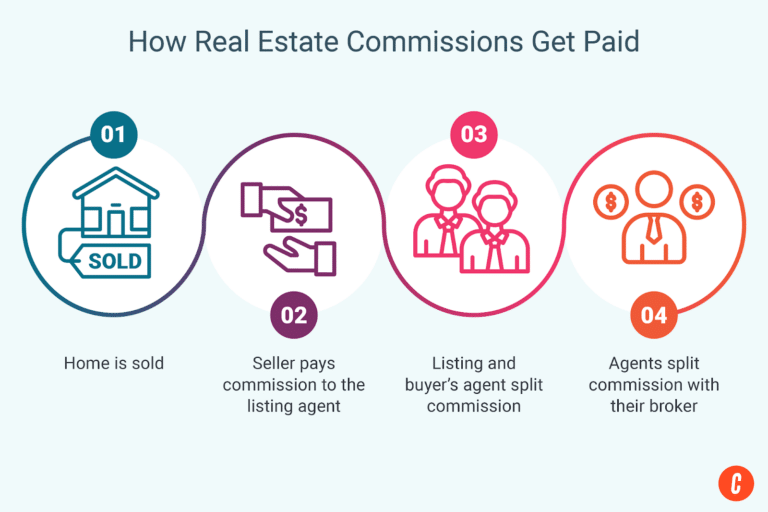
The seller typically pays the commission in sales transactions. This arrangement is agreed upon when the seller signs a contract with a real estate broker during the listing process. The agreement stipulates that a specific percentage of the sale price will be allocated to the real estate agent or broker as a commission. This commission is shared between the listing agent and the buyer’s agent according to the pre-established commission split.
Agents should understand that although the seller pays the commission, the funds come from the buyer’s purchase price. Thus, the buyer indirectly contributes to the commission through the overall price of the property. This understanding can influence how agents approach negotiations and explain the process to their clients.
The payment structure in rental transactions can vary. The landlord usually pays the commission, often equivalent to one month’s rent. However, if a landlord does not offer a commission or it is lower than usual, tenants may be required to pay directly for the agent’s services. This scenario is more common in competitive markets or high-end rentals where personalized service is a significant aspect of the rental process.
How to Negotiate Your Commission Split
Once agents complete their real estate license and seek out a brokerage, they will receive an independent contractor agreement outlining their duties, responsibilities, and the specifics of their commission splits. As you excel in your career, you can negotiate this agreement to reflect your growing expertise, higher sales volumes, and enhanced market knowledge.
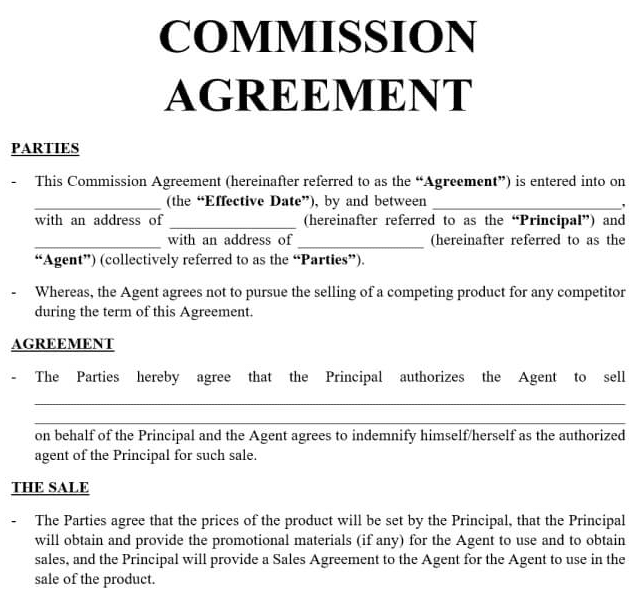
The real estate agent commission split with a broker significantly determines your income. Negotiating a favorable real estate agent commission split can substantially boost your earnings, allowing you to better reap the rewards of your hard work. Many agents will switch real estate brokerages if they feel their current terms do not adequately compensate them for their efforts.
Negotiating terms with your brokerage isn’t just about demanding more—it’s about demonstrating your value, understanding the business norms, and crafting a proposal that aligns your interests with your brokerage’s. Here are strategies to help you effectively negotiate better terms with your brokerage:
- Know your worth: Before entering negotiations, assess your performance metrics, such as sales volume, gross commission income, customer satisfaction ratings, and contributions to the brokerage. Solid evidence of your success strengthens your case for a higher commission split.
- Understand market standards: Research the typical commission splits offered by other brokerages in your area. Knowing the industry standard gives you a baseline for negotiations and can help you argue for a competitive rate. Frequently, you will find many real estate agents have real estate side hustles in these down markets to supplement their income. This approach helps stabilize their earnings during slower periods and broadens their skill set.
- Build a strong case: Prepare to present a clear and compelling argument to your broker. Highlight your achievements, continuous professional development, and how you’ve added value to the brokerage. Be specific about your goals and how a better split will motivate you to work even harder.
- Consider timing: Timing can be crucial. Approach your broker about a better split during times of success, like closing a big deal or surpassing your sales targets. Alternatively, annual reviews are natural times for such discussions.
- Offer solutions: Be prepared to offer solutions that benefit both the brokerage and you. For instance, propose a graduated split that increases as you hit higher sales targets or suggest taking on additional responsibilities in exchange for a higher split.
- Practice negotiation skills: Effective communication is key in negotiations. Practice your negotiating techniques, possibly with a mentor or colleague. Being calm, clear, and professional during these discussions can lead to more favorable outcomes.
- Be ready to compromise: While you should aim for the best possible terms, prepare yourself to find a middle ground. If a higher split is off the table, consider other benefits such as marketing support, leads, or better operational tools.
- Get everything in writing: Once you reach an agreement, document all details. This step protects both you and the brokerage and clarifies the terms of the new agreement.
What Factors Can Affect Commission Income?
This commission rate varies significantly depending on geographical location and property type. For instance, in some cities, sellers might pay as little as 4% in realtor fees, while in others, the rates can climb to 7% for residential properties and even up to 10% for commercial real estate.
Location plays a critical role in determining commission rates in the real estate industry. Market conditions, average property values, and local competition all influence how much agents can charge for their services. Due to higher agent competition, commission rates might be lower in bustling urban centers.
In contrast, higher rates may prevail in rural areas due to fewer transactions and the need for more extensive marketing efforts. Understanding the nuances of your local market is essential for setting realistic commission expectations and negotiating effectively with clients and brokerages.
Average Real Estate Commissions Across the U.S.
Understanding the typical commission rates in the real estate market is crucial for agents to know what is a good commission split in real estate. Then, they can set competitive and realistic expectations for their earnings. The average real estate commission in the United States is between 5% and 6% of the property’s sale price, typically split between the buyer’s agent and the listing agent.
| State | Average Commission Rates | State | Average Commission Rates |
|---|---|---|---|
| Alabama | 5.52% | Montana | 5.67% |
| Alaska | 4.99% | Nebraska | 5.71% |
| Arizona | 5.68% | Nevada | 5.08% |
| Arkansas | 5.72% | New Hampshire | 5.19% |
| California | 5.14% | New Jersey | 5.17% |
| Colorado | 5.58% | New Mexico | 5.83% |
| Connecticut | 5.38% | New York | 4.66% |
| DC | 5.3% | North Carolina | 5.56% |
| Delaware | 5.18% | North Dakota | 6.0% |
| Florida | 5.53% | Ohio | 5.81% |
| Georgia | 5.84% | Oklahoma | 5.63% |
| Hawaii | 5.39% | Oregon | 5.43% |
| Idaho | 5.69% | Pennsylvania | 5.44% |
| Illinois | 5.29% | Rhode Island | 4.86% |
| Indiana | 6.08% | South Carolina | 5.94% |
| Iowa | 6.15% | South Dakota | 6.0% |
| Kansas | 5.8% | Tennessee | 5.8% |
| Kentucky | 5.69% | Texas | 6.0% |
| Louisiana | 5.2% | Utah | 5.39% |
| Maine | 6.0% | Vermont | 6.0% |
| Maryland | 5.46% | Virginia | 5.58% |
| Massachusetts | 5.25% | Washington | 5.67% |
| Michigan | 5.93% | West Virginia | 5.44% |
| Minnesota | 5.53% | Wisconsin | 5.86% |
| Mississippi | 5.62% | Wyoming | 5.5% |
| Missouri | 5.79% | (Source: FastExpert) | |
Frequently Asked Questions (FAQs)
What is the typical commission split between agent & broker?
The typical commission split between an agent and their broker can vary widely, but standard arrangements include 50/50, 60/40, and 70/30 splits. The specific split often depends on the agent’s experience, sales volume, and the brokerage’s policies. More experienced agents or those producing higher sales volumes may negotiate more favorable splits.
What does a 60/40 split mean as a commission?
A 60/40 commission split means the agent receives 60% from a real estate transaction, while the broker gets 40%. This type of split compensates the agent for their direct work with clients and the brokerage for providing support, resources, and brand affiliation.
How is a real estate agent’s commission split with a broker?
A real estate agent’s commission is split with a broker according to their agreed-upon contract. This split typically reflects the support and resources provided by the brokerage, such as office space, marketing, and administrative assistance. After a property sale is completed and the seller pays the commission, it is first received by the brokerage. The brokerage then disburses the agent’s share according to the negotiated split. This model aligns the interests of the agent and brokerage, encouraging both parties to contribute effectively to the sales process.
Bringing It All Together
The real estate industry is about more than finding the right properties. It’s also about nailing the perfect commission split that makes every sale feel like a celebration! As you set off on this exciting journey, understanding and choosing your commission structure is as crucial as picking the right shoes for a marathon. With each transaction, your knowledge of commission splits isn’t just padding your wallet but also fueling your career growth and ensuring your efforts are recognized.
Remember, the art of negotiation is your secret weapon. Whether you’re the fresh face on the block or the seasoned and successful real estate pro everyone whispers about, negotiating your commission split is your chance to shine. Show off your value, and don’t settle for less than you deserve. Brokerages come in all shapes and sizes, each offering a smorgasbord of commission options. Align yourself with a good brokerage that’s as invested in your success as you are.
The post Real Estate Commission Splits: Everything Agents Need to Know appeared first on The Close.
Agently is like your modern real estate coach equipped with an innovative toolkit to streamline operations and maximize agents’ productivity. Agently’s capabilities to store customizable onboarding checklists and training modules and track financial goals make it easy for brokers to support their team’s professional development. I have researched Agently, scrutinized current Agently reviews, and tested its platform to outline its key features, evaluate pricing, weigh its pros and cons, and tell you whether it’s worth your money. Let’s jump in!
Agently Pros & Cons
| Agently Pros | Agently Cons |
|---|---|
|
|
My Verdict on Agently & Why You Should Trust It
With my extensive research experience in various real estate topics, I can provide readers with a thorough analysis of Agently’s platform and features—objectively highlighting its strengths and limitations. My commitment to honesty and transparency at The Close guarantees that my Agently reviews will provide valuable insights into your decision-making process.
Agently goes beyond traditional real estate management and lead generation platforms by offering robust coaching and training features to support brokerage owners and agents. With Agently, brokerage owners can streamline agent operations, including the onboarding process and training courses.
This approach to agent development enhances productivity and fosters a culture of continuous improvement within small brokerages. Therefore, Agently is an ideal choice for solo agents or small teams searching for a modern, user-friendly solution to streamline their operations and empower their teams.
Agently Alternatives
While Agently is a great platform for professionals looking to maximize efficiency, other platforms better suit agents’ and brokerages’ budgets and real estate needs. Agents and brokers looking for budget-friendly solutions might feel like Agently is too pricey, and those seeking instant customer support might find that Agently’s support team takes too long to respond. Here are some alternatives worth considering.
| Platform | Why It’s a Great Alternative | Learn More | Ready to Purchase? |
|---|---|---|---|
| It’s a real estate company providing coaching, branding assistance, and a community of 80,000 agents. | No review yet | Visit Radius Agent | |
| It has a transaction management feature and can integrate with more platforms for a more efficient workflow. | No review yet | Visit Rechat | |
| It’s a customer relationship manager (CRM) that boasts strong automation and lead nurturing tools. | LionDesk review | Visit LionDesk |
| Platform | Why It’s a Great Alternative | Learn More | Ready to Purchase? |
|---|---|---|---|
| It’s a real estate company providing coaching, branding assistance, and a community of 80,000 agents. | No review yet | Visit Radius Agent | |
| It has a transaction management feature and can integrate with more platforms for a more efficient workflow. | No review yet | Visit Rechat | |
| It’s a customer relationship manager (CRM) that boasts strong automation and lead nurturing tools. | LionDesk review | Visit LionDesk |
Agently Reviews: What Current Users Think of Agently
There aren’t many third-party Agently reviews yet, as Agently is still fairly new to the game. However, the feedback from early users has been positive, with many praising Agently’s interface and features. While Agently may be relatively new, its growing user base suggests a promising future for this real estate management market player. Below are some Agently reviews:




“All in all, it’s the software’s simple goal setting and ability to serve as a daily activity check-in that, to me, offer the most value. A lot of big, broad enterprise business systems and CRMs offer agent-specific goal setting and tracking, but they’re not designed specifically around the newly licensed agent. This is meant for them, for the agents that need direction.” — Inman



“The AI powered property description generator is a game-changer. You just fill out the required info about your new listing, like the price and number of bedrooms, etc. The generator will then allow you to click through several options to find the description that best fits the property.” — Agent Advice
Key Features of Agently
In this section, let’s take a closer look at Agently’s strengths and areas for improvement.
Agently Dashboard
Agently’s dashboard is a centralized hub for real estate brokers and agents to manage their activities efficiently. Upon logging in, brokers are greeted with a clean, intuitive interface, offering at-a-glance insights into engagement, training, accountability, and recognition. Solo agents, on the other hand, are welcomed with today’s tasks, challenges, their goal tracker on the right, and training courses assigned to them.
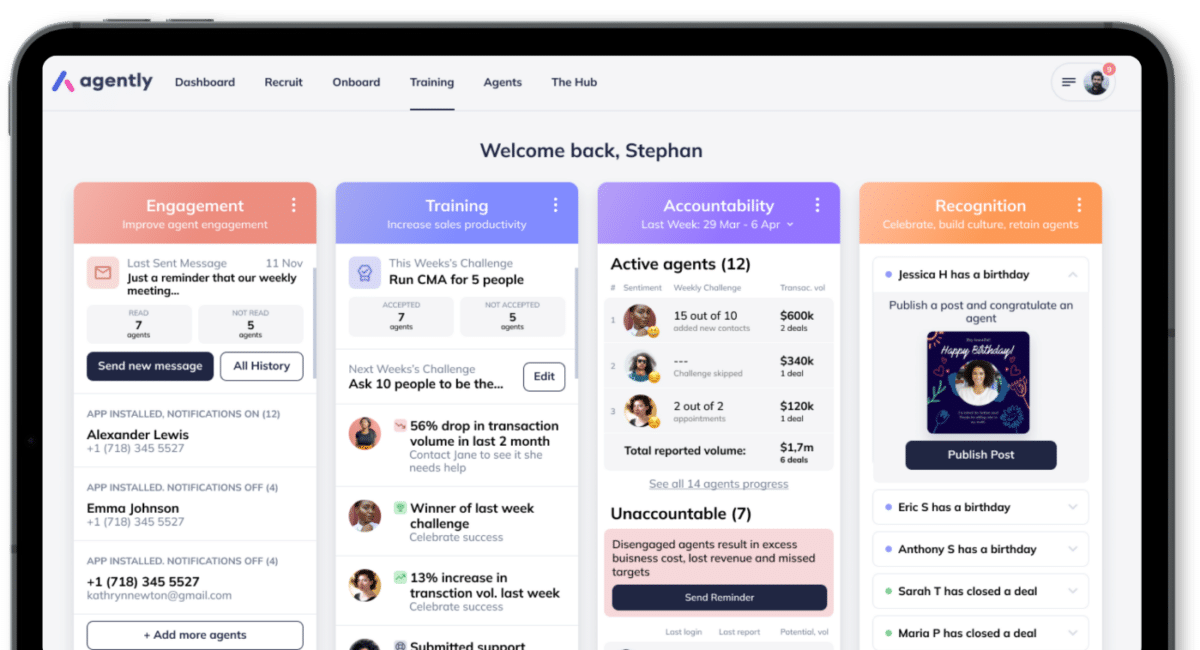
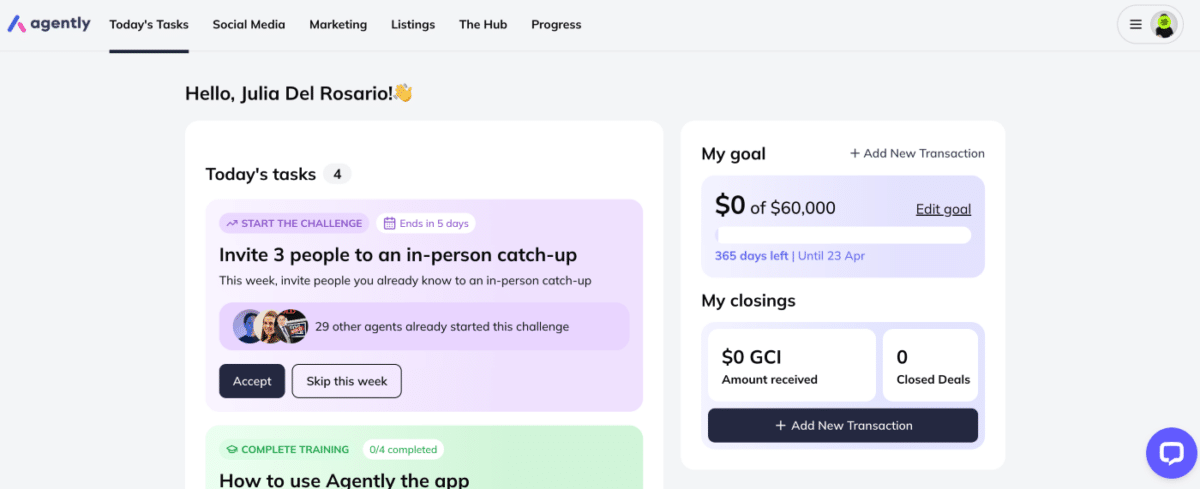
Agent Coaching & Onboarding
Agently provides comprehensive coaching and training features tailored to the needs of brokerage owners and agents. Through the platform, brokers can do the following:
- Create personalized onboarding checklists, guiding new agents through tasks such as downloading onboarding videos and documents, familiarizing themselves with brokerage manuals, and updating their real estate agent bios
- Upload and receive documents requiring agents’ signatures
- Provide access to various training materials, such as legal, marketing, and sales training videos
- Create coaching challenges to motivate agents and enhance sales productivity
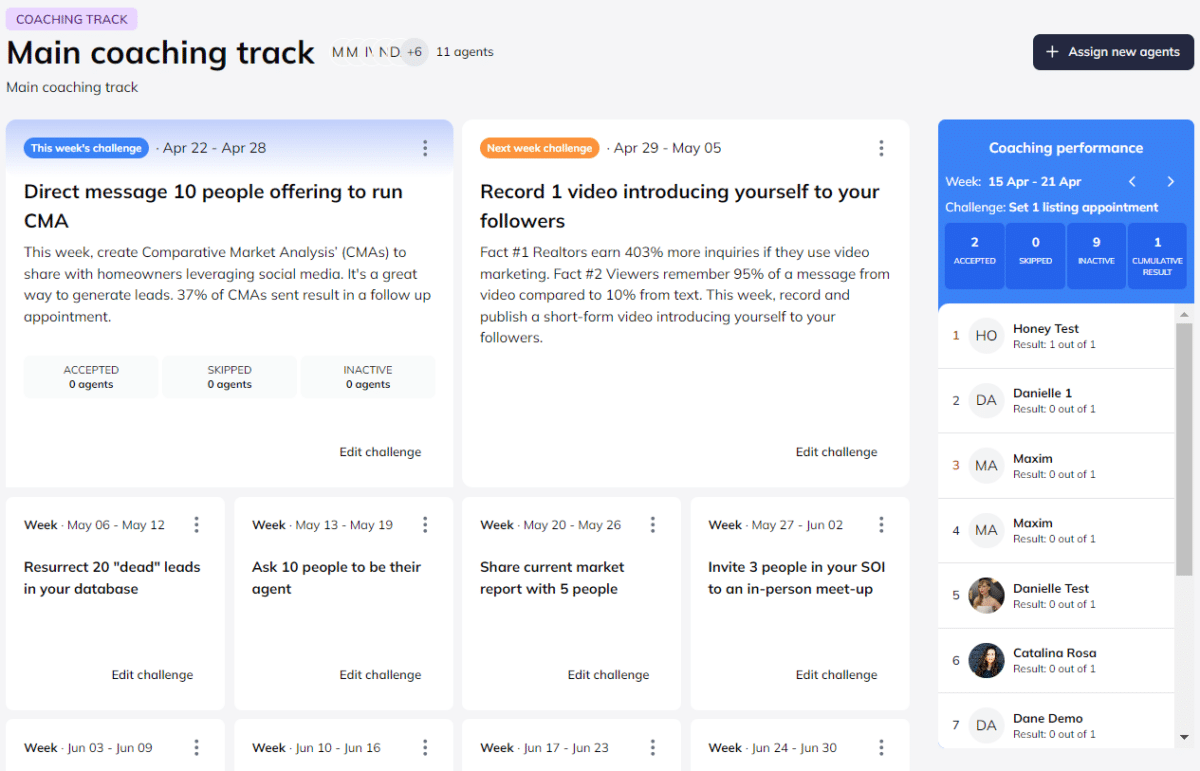
Goal Setting
Agently offers goal setting and tracking capabilities to help agents achieve their weekly or annual goals. Agents can set specific goals, such as client acquisition milestones and sales targets. Team leaders, on the other hand, can monitor and ask agents how they’re progressing toward their goals. However, while agents can set their goals through the platform and monitor their progress, this can appear to be a competition among agents within a brokerage.
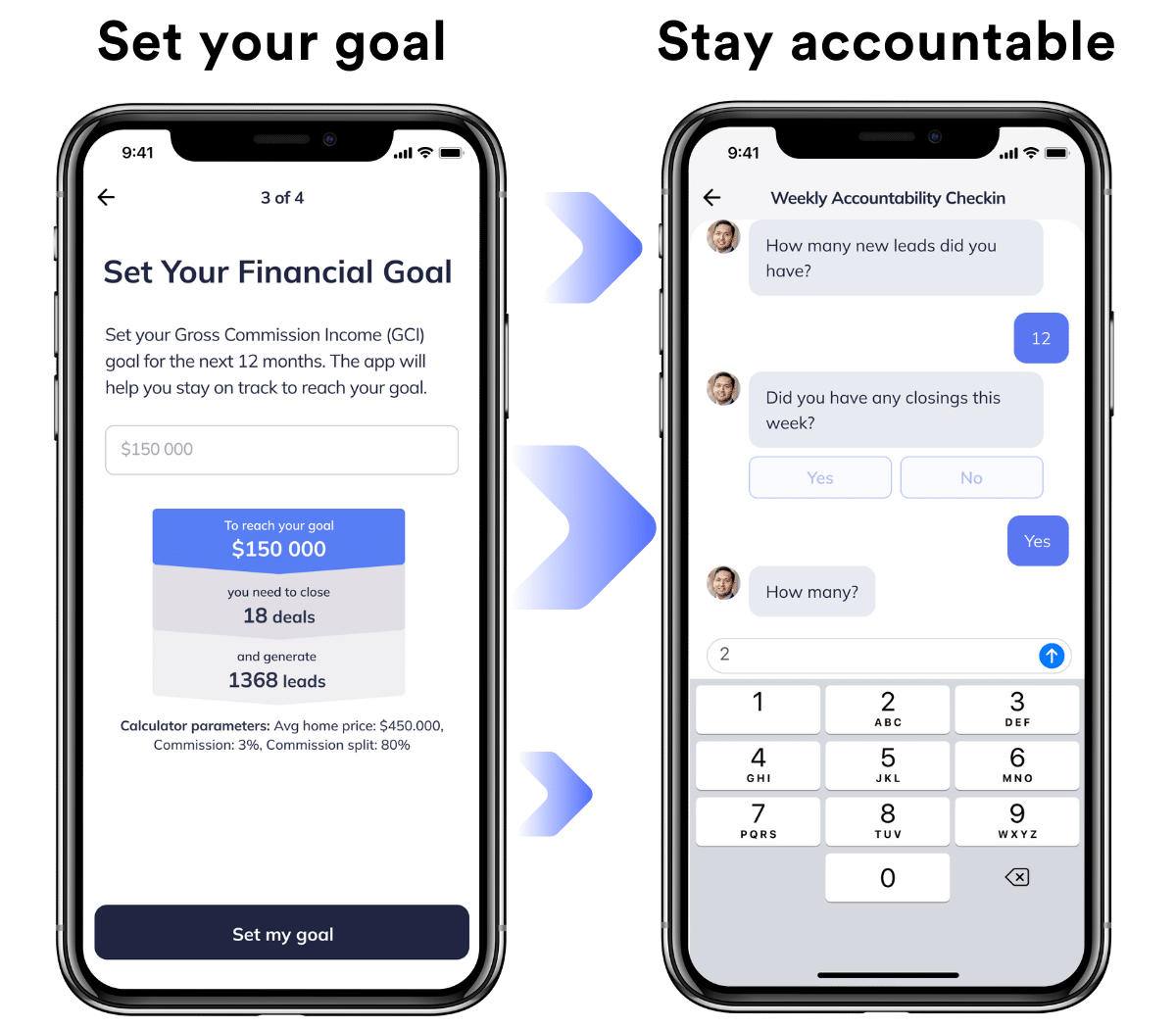
The Hub
Agently’s Hub is a location for storing files, contracts, templates, and other assets, allowing seamless file sharing. It’s like Agently’s Google Drive, where teams can centralize important documents. Not many platforms offer storage, so this is an excellent feature from Agently.
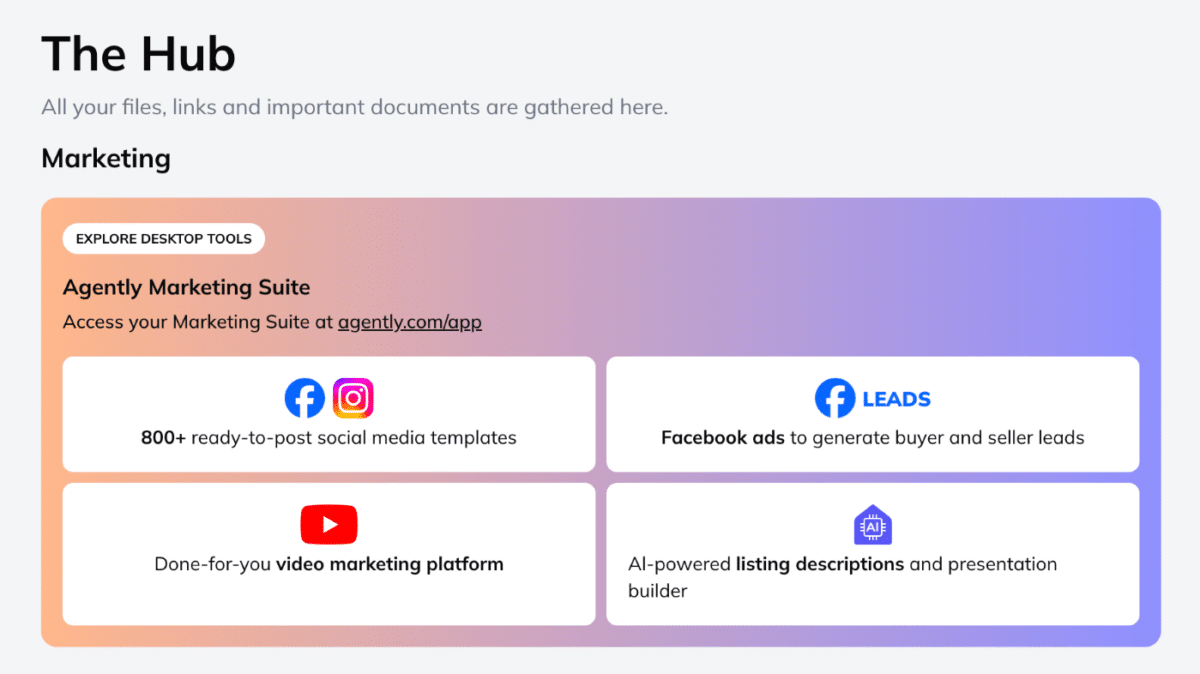
AI Marketing Suite
Agently is a great lead generation tool for agents. Agents can get buyer or seller leads by creating video posts based on Agently’s topic suggestions or creating ads and posting them directly on social media. Additionally, I’m impressed with Agently’s artificial intelligence (AI) listing builder. This tool simplifies the creation of visually appealing listings by allowing agents to upload photos, which are then enhanced using AI algorithms. Afterward, Agently generates a comprehensive MLS description that is ready to be posted.
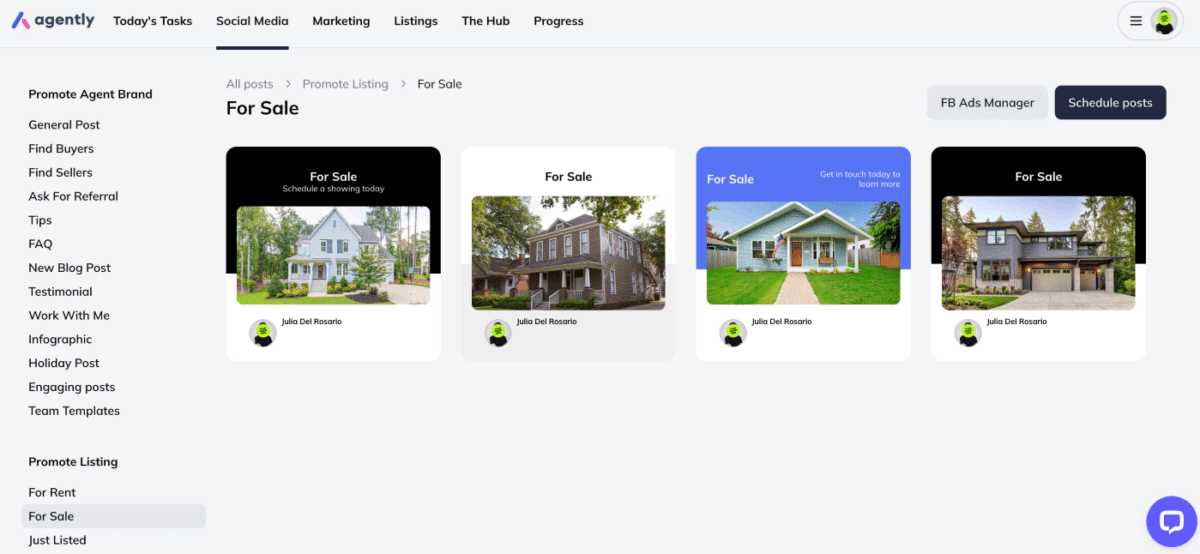
Agently Pricing
Agently offers transparent pricing plans to accommodate the needs of solo agents and small brokerages. If you have a limited budget as a solo agent, Agently can be cost-prohibitive. But if you’re a broker coaching many agents, you can ask your agents to pay a small charge to cover Agently’s monthly cost for brokerages or cover it from earned commission splits.
Here are the features and benefits of each subscription plan so you can determine which best suits your business goals. If you’re still exploring other options, Agently offers a seven-day free trial.
| For Solo Agents | For Teams or Brokerages | |
|---|---|---|
| Price | $59 per month or $459 per year | $279 per month |
| Features included |
|
|
Methodology
In my assessment of Agently, I conducted thorough research to ensure accuracy and reliability in the final evaluation. At The Close, we aim to guide real estate professionals in making informed decisions. We analyzed Agently’s platform, its pricing structure, features, user feedback, and reputation, and then based our Agently reviews on the following criteria:
- Value for Money
- I reviewed Agently’s pricing, subscription plans, and whether it offered discounts or bulk pricing.
- Features
- I considered features such as its management dashboard, marketing suite, agent onboarding, listing builder, social media templates, and goal tracker.
- User Interface
- I evaluated Agently’s user interface, customizability, and operation ability.
- Reputation
- I examined Agently’s overall reputation and usability through verified user reviews.
- Help & Support
- Phone, email, and live chat availability were assessed for real estate agents needing support.
- Expert Score
- The Close reviewed Agently for standout features, value for money, and additional considerations from a real estate agent’s perspective.
Read more about our methodology here.
FAQs
How much is Agently per month?
Agently costs $59 monthly for solo agents and $279 for a team or brokerage. For that amount, you’ll have access to Agently’s premium features, such as lead generating ideas and social media templates. Check out our Agently pricing section above for more information on features in each subscription plan.
Does Agently offer mobile accessibility?
Yes! Agently is a web-based platform you can access through your mobile or tablet. Its clean interface is user-friendly and easy to set up.
Can Agently integrate with other software or platforms?
Absolutely! With just one click, you can easily sync your CRM to Agently, enhancing its functionality with existing workflows. This integration feature allows agents to leverage Agently’s full potential alongside their preferred software.
Bottom Line: Is Agently Worth Your Money?
Agently revolutionizes the way real estate brokers and agents work together. From agent management to helping agents acquire leads, Agently offers a comprehensive suite of tools to boost productivity and streamline processes. It provides essential tools for starting agents without overwhelming complexity. Additionally, Agently’s suitability for smaller brokerages lies in its tailored approach to real estate management. But while Agently excels in simplifying operations for smaller players in the industry, those seeking advanced functionalities may find other platforms better suited to their needs.
Your Take
At The Close, we’re committed to giving real estate agents solutions to your needs. Have you tried Agently? What do you think about it? We’d like to hear your Agently reviews—let us know in the comments!
The post Agently Review: Pricing, Features, Pros & Cons (2024) appeared first on The Close.
Selecting the right company name is one of the biggest hurdles in starting your business. After all, your company name is the foundation of your brand identity, conveying your values and expertise to prospective clients. If you’ve already nailed down a business name right off the bat, I say you’re one lucky agent! But if you still need help, here are some creative real estate company names, steps to creating your own, and our free real estate name generator.
45 Real Estate Business Names to Inspire You
Before choosing your own, consider these real estate name ideas for inspiration. You’ll find that many successful companies incorporate terms like “Realty,” “Properties,” “Real Estate Group,” and “Property Advisors.” What will you choose for yours?
| 1 | Agile Real Estate Group | 24 | Lark Homes |
| 2 | Anchor Group Real Estate | 25 | Lighthouse Group Real Estate |
| 3 | Beacon Homes LLC | 26 | Magnolia Group Real Estate |
| 4 | Blue Reef Properties | 27 | Nestled Real Estate |
| 5 | Bond & Main Real Estate Group | 28 | Nova Group Real Estate |
| 6 | Brick Lane Realty | 29 | Olive Tree Realty |
| 7 | Capstone Realty | 30 | Orchard Street Properties |
| 8 | Citadel Partners Realty | 31 | Pagoda Partners Realty |
| 9 | Cobblestone Realty Partners | 32 | Picket Fence Realty |
| 10 | Devoe Partners | 33 | Pilot Property Group |
| 11 | Divine Nooks | 34 | Pinnacle Real Estate |
| 12 | Equinox Realty Advisors | 35 | Platinum Property Advisors |
| 13 | Finders Group Realty LA | 36 | Privet Group Real Property |
| 14 | Forward Real Estate Advisors | 37 | Red Coral Realty |
| 15 | Granite Real Estate | 38 | Rise Real Estate |
| 16 | Haven Group Real Estate | 39 | Shipwright Realty |
| 17 | Herringbone Realty | 40 | Siren Partners Real Estate |
| 18 | Home & Hearth Realty | 41 | Summit Properties |
| 19 | Jasper Realty | 42 | Sunstone Property Advisors |
| 20 | Keystone Group Real Estate | 43 | The Viola Group |
| 21 | Lamplighters Realty | 44 | Titan Real Estate |
| 22 | Landmark Realty Group | 45 | Zenith Estates |
| 23 | Larkspur Partners Realty |
How to Make Your Real Estate Company Name
Creating an excellent name for your real estate company is key to establishing a solid brand identity. Here are some of my steps and strategies to help you create a name that will resonate with your target market.
Step 1: Define Your Brand Values & Audience
In any business, it’s essential to understand your brand’s core values and target market. What sets your company apart? What message do you want to communicate to future clients? Identifying your brand values and target audience will guide you in selecting a company name that perfectly reflects your agency’s identity. Here’s an example from one of the company names above:
Company name: Anchor Group Real Estate
Target market: Clients who want to purchase beachfront homes, waterfront estates, and properties with ocean or lake views
Brand values:
- Stability: We are committed to providing our clients a stable foundation and service as their anchor throughout their real estate journey.
- Guidance: Just as an anchor provides direction, we are committed to guiding our clients and helping them navigate the complexities of their buying experience.
If you want to learn more, read our real estate branding guide.
Step 2: Research Your Competitors’ Company Names
Avoid choosing a company name that sounds like your competitors to prevent client confusion and establish a unique identity. It’s critical because you don’t want prospective clients visiting your competitor while thinking they’re contacting you.
Here are some tips you can follow to avoid duplicating a competitor:
- Research existing real estate companies in your state and internationally.
- Analyze other companies’ naming strategies and consider how to differentiate your brand.
- Ensure your company name is distinct and stands out from the competitors while aligning with your brand identity and values.
- If you’re an established brand and find similarities, focus on your brand colors, real estate slogan, and differentiators.
Step 3: Keep It Short & Simple
Have you ever noticed how the world’s top companies have short names? Some are only recognized through their acronyms, e.g., BMW, BBC, IBM, DHL, and HSBC. This brand recognition strategy is why keeping your company name short and simple is crucial. Consider these tips for a short business name:
- Make your name short and easy to spell: In business, a brief company name is preferential for easy recall. Opt for company names that are simple and easy to remember to avoid confusing potential customers. A concise name also works well for branding and marketing materials such as signs, business cards, social media handles, and logos.
- Pay attention to how your company name sounds when spoken out loud: Your name may look great on paper, but how will it sound when a former client talks about your company over lunch with a friend? One of the best ways to do this is to write down your name and see if your co-workers and even strangers can pronounce it easily. Does it roll off the tongue, or do they stumble while trying to say it?
- Consider your company name’s acronym: A recognizable acronym can improve visibility in marketing materials and strengthen brand recall. When choosing a company name, consider potential acronyms and assess how they align with your brand identity. Even if you don’t plan to use an acronym for your real estate name, ensure yours doesn’t accidentally convey anything lewd or tasteless.
Step 4: Consider Your Geographic Farm Area
Real estate company names should target the people you want to sell real estate to. Are you working in retirement communities in Boca Raton or selling old warehouse spaces to movie directors in LA’s Arts District? As you can imagine, those two companies should have very different names if they want to reach the right audiences.
Also, as you grow as an agent or brokerage, you’ll naturally want to expand your business coverage. So before adding your farm area to your company name, ask yourself where you think you’ll be selling five or 10 years from now. Will you still be in that small town in Albuquerque, or will you expand to Santa Fe? Consider the long-term goals of your business and ensure that your company name is versatile enough to accommodate changes in locations, target audiences, and services.
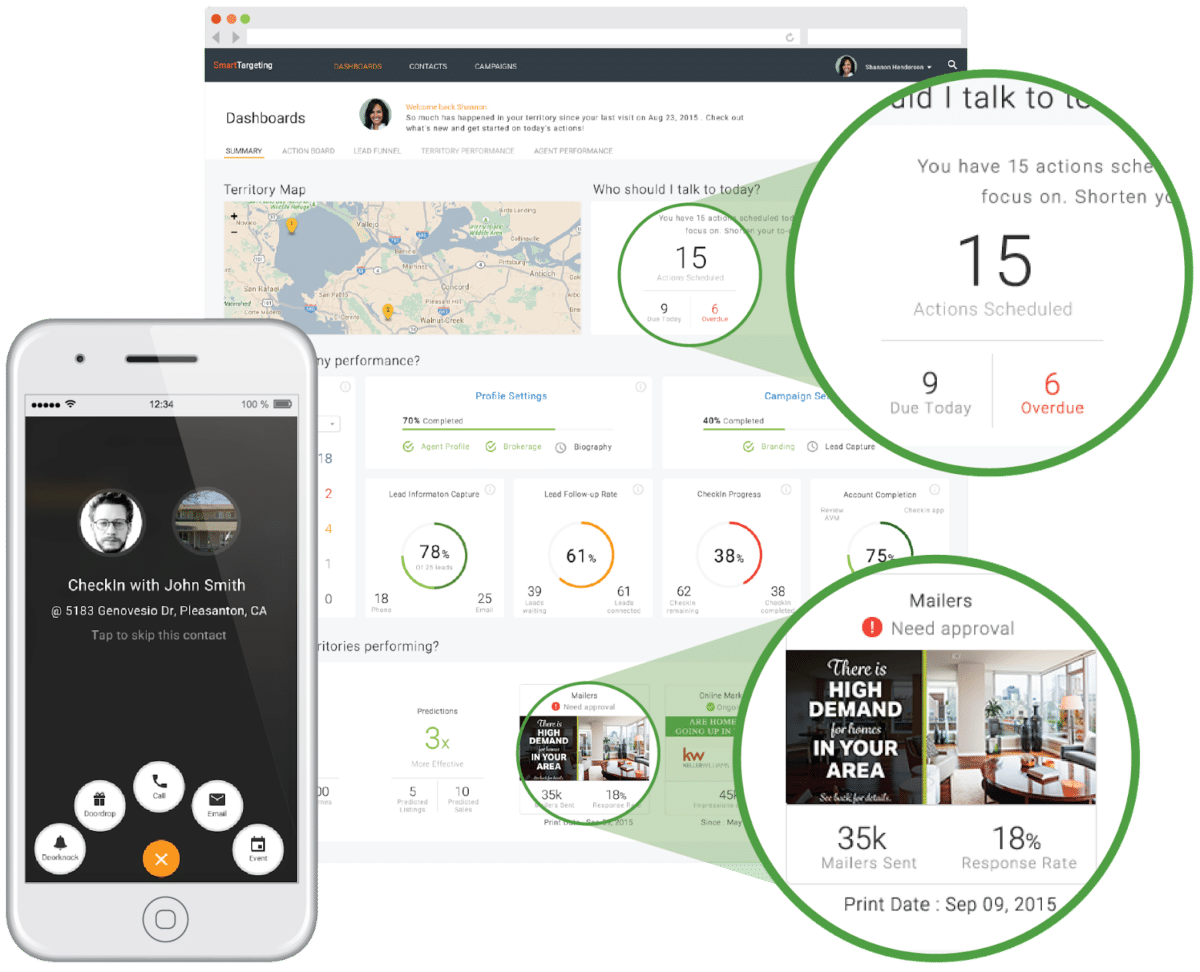
If your real estate company needs help identifying high-potential neighborhoods, properties, and demographics, try SmartZip. SmartZip is a lead-farming tool that can pinpoint properties and areas where homeowners are more likely to buy or sell.
Step 5: Brainstorm & Come Up With as Many Names as You Can
Creativity is vital when brainstorming real estate company name ideas. The more real estate business names you come up with, the better! Whatever you do, don’t skip the brainstorming sessions necessary for the ideation process. Get all your ideas up on the whiteboard! Explore different themes, word combinations, and concepts. Once you have a list of potential company names, evaluate each and compare them against all the others on your list, narrowing down your options until you find the perfect fit.
Try artificial intelligence (AI) for other name options. Harnessing AI’s power to create business names can also streamline the naming process. AI tools (e.g., ChatGPT) can generate innovative and relevant name suggestions and look up your competitors’ names and customer preferences. However, keep in mind that humans are still better than robots when it comes to naming businesses.
The Close’s Real Estate Name Generator
Need help to brainstorm name ideas? Try our real estate name generator to get you started.
Generate Your Name
Chose a name format
Warning: The company names produced by this generator were created by our team, but it is up to you to verify trademark status.
label.error{
width:100%;
display:block;
text-align:left;
}
.real-estate-name-gen__wrapper {
margin-left: auto;
margin-right: auto;
margin-bottom: 6rem;
padding: 1rem 2rem;
background-color: #fff;
box-shadow: 0 0 25px #e5e5e5;
}
.real-estate-name-gen_btn–back {
display: none;
margin-top: 40px;
}
.real-estate-name-gen__wrapper .table td {
display: block;
padding: 1.25rem;
text-align: center;
font-size: 20px;
font-weight: 700;
}
Things to Avoid When Choosing Your Company Name
Selecting a real estate company name can be stressful and daunting, but knowing what to avoid can streamline your decision-making process.
- Puns, Pop Culture References & Cliches
Choosing a company name that leans on puns, pop culture references, or cliches may seem clever initially, but it can quickly become outdated or fail to connect with your audience. While you and your colleagues might think your pun is hilarious, will everyone find it clever? The answer, of course, is no. Puns may not translate well across different cultures and age groups, limiting your brand’s appeal.
- Long Real Estate Names
Long and complex real estate names can be difficult to remember, pronounce, and type, affecting brand recall and accessibility. In addition, they may need to be more visually appealing in your marketing materials, such as signage, business cards, and print ads. Opt for a short and memorable name that’s easy to spell and pronounce.
- Trademarked Real Estate Firm Names
Selecting a real estate company name already trademarked by another firm can only lead to legal conflicts, a damaged reputation, and costly rebranding efforts. Use search engines, social media, and trademark databases, and consult legal experts to verify the availability and legality of your desired company name. It’s always better to be safe than sorry!
Exercise caution when using the term “Realtor.” Since the National Association of Realtors (NAR) owns the trademark on the word Realtor, they have rules about how to use it. If you’re not a dues-paying member of NAR, they won’t let you use it at all. If you are an active Realtor, there are still restrictions around using the word in your branding. Read NAR’s Membership Marks Manual and make sure you’re committed to long-term association membership before you tie your business presence to this protected—and regularly policed—brand name.
Next Steps After Picking Your Company Name
Once you’ve come up with a great name, the next step is crafting a brand around it, which involves creating a brand identity and establishing your presence across all marketing channels.
Come Up With Your Real Estate Logo & Slogan
Create an effective real estate slogan and a visually appealing logo. Of course, this doesn’t happen overnight! Your slogan and logo should be carefully considered and tested by a sample audience. Do they evoke professionalism and audience recall? Your motto should be concise and reflective of your brand identity, while your logo should incorporate elements like your brand’s color scheme, typography, and imagery. Work with graphic designers and copywriters to develop your brand’s slogan and logo.
Claim Your Social Media Accounts
Since competition for online real estate has become more intense over the past years, you need to act quickly and get your social media accounts up and running. Establishing a strong online media presence is no longer an option—it’s a necessity for staying relevant in the real estate industry. And while you’re at it, don’t forget your real estate agent bio! Your bio should highlight your experience, expertise, and personality.
Before settling on a real estate company name, search for your desired social media handles and domain names. If another entrepreneur has already staked a claim, you could set yourself up for an uphill battle.
Buy Your Domain & Build Your Website
Securing a domain name that matches your real estate name is essential for establishing a professional online presence. Ensure you buy a domain that’s easy to spell and relevant to your business and location. Once you’ve acquired your domain, invest in a website that showcases your expertise, services, agents, and property listings. Incorporate your logo, slogan, and other branding elements into your website. To streamline your process, check out our guide on the best real estate website builders.
If you want an affordable website that you can set up quickly and scale as your business grows, try AgentFire. AgentFire has stunning designs and lets you build a custom tech stack, so you never pay for features you don’t need. Sure, many other web designers exist, but most realtors who choose AgentFire never look back.
Register Your Business
Before giving out your business cards to prospective clients, register your business to establish legitimacy. Depending on your location and firm structure, you may register as a sole proprietorship, partnership, limited liability company (LLC), or corporation. Look up your area’s registration requirements and processes and consult with legal professionals to ensure compliance with local laws and regulations. Registering your company allows you to acquire necessary permits, get tax benefits and deductions, and open company bank accounts.
Trademark Your Company Name
Trademarking your real estate company name provides legal protection against unauthorized use. Begin by searching to confirm your chosen name’s availability through the United States Patent and Trademark Office’s Trademark Electronic Search System. Once you’ve confirmed your company name’s availability, file a trademark application and secure exclusive rights to your name.
Start Promoting Your Company
Finally, with your business name and assets in place, it’s time to promote your agency and close deals with clients. Develop a comprehensive marketing plan to generate leads and reach your target audience. Use social media platforms, search engine optimization (SEO), email marketing, print advertising, and other traditional marketing strategies to drive traffic to your website and increase brand visibility.
Need some ideas for marketing your agency? Check out our article on 23 Clever Real Estate Marketing Ideas.
FAQs: Real Estate Company Names
What is the best name for a real estate company?
Picking out the best name for a real estate company is subjective and depends on many factors, such as your target market, geographic location, company goals, and brand values. Consider a name that sets you apart from competitors, sounds good, is easy to pronounce and spell, and reflects your business.
What are good LLC names?
When creating LLC names, choose something that aligns with your company’s objectives and values. A good LLC name for your business should be distinctive and reflective of your brand identity. Beacon Homes LLC is an example of a good LLC name we’ve listed above.
How do I choose a realtor name?
The first step in choosing a realtor name is identifying your brand identity and audience. Are you specializing in luxury homes, commercial real estate, or agricultural properties? Understanding your brand identity and audience will guide you in selecting a name that resonates with your target market and communicates your firm’s goals. For more information, read the steps we’ve enumerated above, what you should avoid when creating your company name, and what to do after finalizing it.
Bringing It All Together
Naming a real estate company is challenging and sometimes stressful. But everything will feel rewarding once you find that perfect name representing your brand identity. I hope my guide has helped you craft a bulletproof company name. Trust the process of bringing your real estate company name to life. Still have burning questions or want to bounce some ideas off our team? Let us know in the comments!
The post 45 Creative Real Estate Company Names + How to Create Your Own appeared first on The Close.
Effective real estate slogans (often called taglines) are a top-producing realtor’s secret weapon for personal, team, or brokerage branding. A memorable slogan should instantly communicate your mission, vision, and values to clients in five words or less. However, writing a memorable slogan for your business is much harder than it sounds. Luckily, I’m here to help! I pulled together the best realtor slogans in the industry and will walk you through the steps to writing your standout slogan (plus, we have a free slogan generator!).
51 Best Real Estate Slogans & Taglines
Before crafting your slogan, let’s explore examples from other real estate companies for inspiration and insight into how they have communicated their brand identities effectively.
1. ‘Live Who You Are’ — Corcoran
Why it works: A simple, welcoming slogan like this makes perfect sense for Barbara Corcoran’s Manhattan brokerage, which she built from scratch. It speaks directly to those who want to embrace their Manhattan lifestyle, highlighting the desire for authenticity in one of the world’s most vibrant cities.
Need some help building your own personal brand? Check out our guide on Real Estate Branding: How to Build Your Brand.
2. ‘Ask Elliman’ — Douglas Elliman
Why it works: By inviting questions and requests, this slogan creates a sense of accessibility, positioning Douglas Elliman as a trusted real estate partner. Short and sweet, this tagline from an Elliman advertising campaign sums up the primary value add they offer: expert advice from decades of experience. It also does an excellent job of humanizing a historic luxury brand that might seem unapproachable to some.
3. ‘The Evolution of Luxury Starts Here’ — Aaron Kirman
Why it works: As one of the most successful luxury real estate agents in Beverly Hills, Aaron Kirman is one of the few agents who can make such a bold claim in his slogan. This tagline appeals to wealthy clients seeking unparalleled service and the latest trends in luxury real estate. Of course, you don’t have to sell nine-figure mansions to write a slogan expressing your brand’s mission, vision, and values like Aaron Kirman’s.
4. ‘Everyone Deserves a Dream Home’ — Justin Landis Group
Why it works: Instead of demonstrating his unique selling proposition (USP), Justin Landis expresses his mission as a real estate agent. In other words, he gets up every morning to help people in his community find their dream home. This slogan emphasizes the agency’s mission-driven approach by telling the audience why he does what he does—a far more powerful statement.
5. ‘Integrity, Intelligence, Innovation’ — Coldwell Banker Warburg
Why it works: Playing with alliteration generally either works or doesn’t, and in the case of Coldwell Banker Warburg’s slogan, we think this impactful message works perfectly. It communicates the company’s core values and demonstrates to clients how their agents work. Another reason these words work so well together is they all have the same number of syllables. This creates a rhythm when spoken out loud, which makes the slogan easy to remember.
6. ‘Longevity Is No Accident’ — Nourmand & Associates
Why it works: By highlighting their decades-long presence in the real estate industry, Nourmand and Associates position themselves as experts with a proven track record. This slogan sets them apart from the newer brokerages they compete with. If your brokerage has been selling real estate longer than many new agents have been alive, boasting your history in your slogan is a no-brainer.
7. ‘The Gold Standard’ — Century 21
Why it works: For a brokerage founded in 1971 and one of the most widely recognized brands globally, a slogan like “The Gold Standard” is iconic. First, it reinforces Century 21’s reputation. Second, it reminds their audience of their gold brand color. The slogan’s simplicity also makes it memorable, leaving a lasting impression on clients and potential customers alike.
8. ‘Client Focused. Results Driven.’ — Dolly Lenz Real Estate
Why it works: Dolly Lenz’s slogan focuses on her team’s passion for closing deals and providing client satisfaction and success. Sure, many million-dollar brokers share this commitment, but Dolly Lenz has been doing it longer and better than all. With a career spanning decades of experience, Dolly Lenz has consistently surpassed expectations and set new standards for excellence—which is why her company’s slogan works.
9. ‘Service. Knowledge. Results.’ — Fazendin Realtors
Why it works: In just three words, Fazendin Realtors boils down to the unique value they offer buyers and sellers. Finding your USP and integrating it into your slogan could be challenging, but getting it right will make your slogan more persuasive and help you connect with potential clients on a more personal level. This slogan communicates the brokerage’s values effectively.
10. ‘The Power of Deep Roots’ — Town and Country Real Estate Hamptons
Why it works: Let’s face it. Local knowledge is essential for success in any country region, but it’s crucial in places like New York’s Hamptons. With 65-plus years of combined experience, Town and Country Real Estate Hamptons’ slogan emphasizes its heritage and authority in the industry.
11. ‘Realtor Marketing for Homebuilders Made Easy’ — Ben Cabellero
Why it works: When your clients are multi-billion-dollar homebuilders like Toll Brothers, your real estate slogan needs to spell out the benefits you’re providing them. In this case, Ben Cabellero emphasizes what every corporate bigwig wants: simplicity and convenience. Massive companies are almost always bogged down by complexity, so coming right out and offering them an incredibly valuable service is an offer too good to resist.
12. ‘Luxury Real Estate: Redefined’ — Sotheby’s International Realty
Why it works: As one of the planet’s premier luxury brands, Sotheby’s International Realty wisely acknowledged the evolving nature of luxury real estate through its slogan. After all, with home automation and a truly global market, luxury real estate is changing dramatically. Smart companies keep up and adapt, while those unwilling to change perish.
13. ‘Our Passion Is People. What’s Yours?’ — The Boutique Real Estate Group
Why it works: To help his brokerage stand out, Raj focused on branding that is friendly and accessible but still ticks all the boxes for well-heeled homeowners and buyers. This real estate slogan conveys their customer-centric approach and dedication to building meaningful client relationships. It invites the audience to reflect on their passion, fostering connection.
14. ‘Where Entrepreneurs Thrive’ — Keller Williams Realty
Why it works: As one of the top real estate companies in the world, Keller Williams’ slogan communicates to their target audience of business-minded real estate entrepreneurs. It conveys a sense of opportunity, inviting people to grow their businesses and achieve success within KW’s supportive environment.
15. ‘Sell It Like Serhant’ — Ryan Serhant
Why it works: Leave it to New York City real estate wunderkind Ryan Serhant to develop the catchiest of real estate catchphrases. This slogan conveys confidence and a result-driven approach in real estate. Over the last decade, Ryan Serhant has built one of the most recognized real estate brands. If you want to learn more about how to build a brand like Ryan’s, check out our review of his Sell It Like Serhant real estate branding course.
And that’s not all! Here are more real estate slogans from top industry players:
| 16 | ‘Better Insights, Better Decisions’ — Leslie Garfield |
34 | ‘Successfully Getting Results for Over 25 Years’ — Hugh Cornish |
| 17 | ‘Modern Vision. Timeless Values’ — Jack Conway |
35 | ‘Your Guide to Palm Beach Real Estate’ — Sonja Stevens |
| 18 | 18. ‘Defined by Service & Expertise’ — Long and Foster |
36 | ‘The Ultimate Concierge Real Estate Experience’ — Tanya Dzhibrailova |
| 19 | ‘A Reputation Built on Results’ — Riskin Partners Estate Group |
37 | ‘Successfully Selling Peninsula Homes Since 1977’ — John Shroyer |
| 20 | ‘For Those Who Seek an Exceptional Life’ — Spears Group |
38 | ‘A Realtor Who Knows His Markets’ — Roger Perry Group |
| 21 | ‘Your Gateway to a Richer Life’ — Town and Country Real Estate, The Hamptons |
39 | ‘Proven Results at Every Price Point’ — Team Foster |
| 22 | ‘Local Knowledge, Global Reach’ — Vail Real Estate |
40 | ‘Local Expertise. Global Connections.’ — Neill Bassi |
| 23 | ‘Experience, Integrity & Service’ — Ash Rizk |
41 | ‘A Smart Move!’ — Exit Realty |
| 24 | ‘Knowledge, Experience, Success’ — Adam Kaufman |
42 | ‘We Are Life Changers’ —Pardee Properties |
| 25 | ‘The Next Move Is Yours’ — Douglas Elliman |
43 | ‘A Home Changes Everything’ — New Story |
| 26 | ‘A Fresh Approach to Real Estate’ — Judy Citron | 44 | ‘Extraordinary Reach. Extraordinary Results.’ —The Noble Black Team at Douglas Elliman |
| 27 | ‘Impeccable Guidance, With a Legacy of Proven Success’ — Neal Ward | 45 | ‘Fulfilling the Dream of Home Since 1906’ — Coldwell Banker |
| 28 | ‘Representing the Finest Coastal Luxury Real Estate in Newport Beach’ — Tara Shapiro | 46 | ‘Find Your Place’ — Compass |
| 29 | ‘Live Your Life, I’ve Got This’ — Heather McMaste | 47 | ‘The Right Agent Can Lead the Way’ — RE/MAX |
| 30 | ‘You Couldn’t Be in Finer Hands’ — Briggs Freeman | 48 | ‘Expect Better’ — Better Homes and Gardens Real Estate |
| 31 | ‘Helping Everyone Find Their Place in the World’ — Lila Delman | 49 | ‘Find Homes First. Tour Homes Fast.’ — Redfin |
| 32 | ‘Over 25 Years Matching People & Property in Ojai Valley’ — Patty Waltcher | 50 | ‘The Providence Real Estate Guy’ — Jim DeRentis |
| 33 | ‘Exceptional Properties, Exceptional Results’ — Gary Depersia | 51 | ‘Buckhead’s Most Trusted Agent’ — Betsy Akers |
15 Clever Real Estate Pop-by Ideas to Get More Referrals
How to Write a Real Estate Slogan That Helps Sell Your Brand
Writing effective real estate lines isn’t easy. To help get your creative juices flowing and avoid common writing mistakes, here is my eight-step process for crafting a real estate slogan that can make your phone ring.
Step 1: Find Your Why: Write Your Mission, Vision & Values Statement
Before brainstorming ideas, it can be helpful to determine your mission, vision, and values. This will help you narrow down your unique value proposition and find an element that resonates with buyers and sellers in your farm area. Need help crafting your mission, vision, and values statement? Here are some examples:
Mission: “To help clients achieve all their luxury real estate goals.”
Vision: “To become the most sought-after real estate brokerage in our city, known for our expertise in luxury real estate and commitment to exceeding expectations.”
Values:
- Community: We are committed to giving back to our community and making a positive impact by supporting local events and fostering solid relationships with local businesses.
- Excellence: We strive for excellence in everything, from top-notch customer service to professionalism in all aspects of our jobs.
- Trustworthiness: By showing integrity, we are committed to building trust within our community, clients, and stakeholders.
Step 2: Demonstrate Your Unique Value Proposition as a Realtor
Your slogan should be more than a few nice-sounding words you can put on your website. It needs to show potential clients and customers why they should hire you instead of one of your city’s hundreds of other agents. What makes your brand stand out from your competitors? Whether it’s your unique approach to customer service, out-of-the-ordinary marketing ideas, or expertise in a specific niche, your slogan should communicate why clients choose you as their real estate partner in buying or selling.
Step 3: Start Brainstorming & Writing Real Estate Slogans
Now you need to take all your research from your niche and ideas from our generator below and start writing your real estate slogan. Fair warning: It is harder than it sounds. Try working on writing your slogan in chunks. If you write for an hour on Tuesday, put everything away and don’t look at it again until next Tuesday. Fresh eyes will give you a new perspective and help you find the diamonds in the rough.
Step 4: Ensure Your Slogan Is Short, Easy to Understand & Memorable
- Short: Is your slogan short enough to be a real estate hashtag? The first goal of writing a killer slogan is to be short. Why? Simple. Shorter sentences are much easier for people to remember than long sentences. While this might seem obvious, many agents cram as much information as possible into their slogans, which almost always leads to long and sometimes confusing sentences.
- Easy to understand: If you want your slogan to be effective, people need to understand what it says about your personal brand without having to think about it. The meaning behind your slogan might seem obvious to you, but your audience is not inside your head. To find out if your slogan is easy to understand, send it to a friend or coworker and ask them to tell you what they think it means. If they struggle to explain it—or worse, get it wrong—keep working on it until they get it right.
- Memorable: Even if you devise a short and easy-to-understand slogan demonstrating your value proposition, it won’t help you sell your personal brand if people forget it.
Step 5: Listen to How Your Slogan Sounds
After you’ve written a few slogans, try saying them out loud. Do the words have a pleasant rhythm? One way to instantly add rhythm to your slogan is to try to sum up your value proposition into just three words. Here are a few examples:
Honesty, Integrity, Experience
Integrity, Intelligence, Innovation
Simple. Smart. Powerful.
Alliteration—repeating the same letter or sound at the beginning of each word of a sentence—is an excellent way to make your slogan easier to remember. You might also try playing with repeating the same word. Here are a few slogans that use alliteration:
Your Neighbor, Your Realtor
Exceptional Properties, Exceptional Results
Extraordinary Reach. Extraordinary Results.
Unrivaled. Unmatched.
Lastly, consider your slogan’s acronym, as this can make your brand stand out. Avoid using acronyms with unintended meanings or negative connotations that can harm your reputation. Take this FART bus, for example. Not only does it sound funny, but it also creates an unintended association that detracts from the brand’s credibility. Remember, a well-thought-out slogan and acronym combo can leave a lasting impression.
Step 6: Your Slogan Should Resonate With Buyers & Sellers in Your Neighborhood
Your slogan must connect meaningfully with your potential clients and customers. Test your slogan with a sample audience to gauge their reactions. If they don’t instantly understand what it means or doesn’t reflect their values, choose another slogan.
Step 7: Consider Legalities
Before finalizing your slogan, here are some legal aspects you should consider:
- Ensure that your slogan doesn’t violate others’ intellectual property rights. Do not incorporate any element that belongs to others without proper authorization.
- See that your slogan is culturally sensitive and contains no offensive language that could damage your brand’s reputation.
- It’s important to note that only distinctive and highly creative slogans can be trademarked. Therefore, ensure that no other company in the same industry has taken your slogan. Check the United States Patent and Trademark Office’s Trademark Electronic Search System to check that your slogan isn’t registered.
- Verify that you can use the slogan in all your marketing materials. If your employees created it, they should be appropriately credited and compensated.
Step 8: Finalize Your Slogan
Almost there! Based on feedback and legal considerations, make the necessary changes to finalize the wording of your slogan. Your company’s slogan should align with your brand identity and resonate with your audience. Then, you may start incorporating your slogan into your marketing materials, including your social media accounts, website, business cards, and real estate signs. Use your slogan consistently across all your marketing channels to boost brand recognition.
The Close’s Custom Real Estate Slogan Generator
You asked, and we delivered. Click below to access our real estate slogan generator, which allows you to create dozens of unique, hyperlocal real estate slogans with one click. Simply input your farm area and the year you launched your business, and our generator will deliver slogans that match your brand. If you don’t like what you see, click the button again to generate more slogans.
Custom Real Estate Slogan Generator
Warning: The slogans produced by this generator were created by our team, but it is up to
you to verify trademark status.
FAQs: Real Estate Slogans
What is the best slogan for real estate?
Singling out the best real estate slogan is subjective and depends on several factors, such as the company’s brand identity, the slogan’s effectiveness, and the target audience. A compelling slogan should be simple and memorable. It should also communicate the real estate company’s values.
What are some good real estate quotes?
There are thousands (if not millions!) of great real estate sayings from professionals worldwide, and here are some of my favorites:
- “In business, you’re the chief salesman. Create a sense of demand, rather than waiting to have demand.” — Barbara Corcoran
- “It’s not about the money, though that’s nice to have. At the end of the day, it’s really about matching the right buyer to the right seller. We’re matchmakers—real estate matchmakers.” — Valerie Fitzgerald
- “As a real estate professional, if you’re trying to build a big business, you need to invest in that business.” — Glenn Sanford
Want more good real estate mottos? Check out our list of 99 Inspirational Real Estate Quotes You Haven’t Heard 1,000 Times.
What are some catchy slogans?
I love many realtor slogans! My favorite catchy real estate phrases include Coldwell Banker Warburg’s “Integrity, Intelligence, Innovation,” Keller Williams Realty’s “Where Entrepreneurs Thrive,” and Nourmand & Associates’ “Longevity Is No Accident.”
Bringing It All Together
Real estate slogans are more than just your elevator pitch—they’re your elevator door pitch. When you have one second to convey your message, you must make those few words count. What are you going to say? What message do you want to send? We hope this guide helped you find out. Still stuck on your slogan? Let us know in the comments, and we’ll try to help!
The post 51 Best Real Estate Slogans & Taglines appeared first on The Close.
Are you ready to take your business to the next level? I’ve got just the thing to help you—a foolproof real estate business plan. But before you start thinking, “Ugh, not a boring business plan for real estate,” hear me out. I’ve got a template that’ll make the process a breeze. Plus, I’ll walk you through seven easy steps to craft a plan to put you ahead of the game and have you achieve your wildest real estate dreams in no time. Your success story starts now.

Grab My Real Estate Business Plan Template
Key Takeaways:
- A well-crafted business plan is your roadmap to success. It guides your decisions and keeps you focused on your goals.
- Create a solid plan by defining your mission, vision, and values, analyzing your market and ideal client, conducting a SWOT analysis, setting SMART goals, and creating a financial plan.
- Regularly track your progress, review your key performance indicators (KPIs), stay flexible, and seek accountability to ensure long-term success.
- Remember, your Realtor business plan should evolve with your business. Embrace change and stay focused on your goals to make your real estate dreams a reality.
Do Agents Really Need a Real Estate Business Plan?
Absolutely. Your real estate agent business plan is your roadmap to success. Without it, you risk losing direction and focus in your real estate career.
A well-crafted business plan helps you:
- Understand your current position in the market
- Set clear and achievable goals
- Create a roadmap for success
- Track your progress and performance
- Make informed decisions and adjustments
Think of your real estate business planning as your GPS, guiding you from your current situation to your desired destination. It serves as your North Star, keeping you focused and on track, even in challenging times. Invest the time to create a solid business plan, and you’ll be well-positioned to succeed in your market and achieve your goals. Your future self will appreciate the effort you put in now.
Write a Real Estate Business Plan in 7 Easy Steps
Before we dive into this section, get our real estate business plan template (click here to go back up to grab it) and work through it as I explain each section. I’ll give you some direction on each element to help you craft your own business plan.
1. Identify Who You Are as a Real Estate Agent
Let’s start with your “why.” Understanding your purpose for choosing real estate is crucial because it is the foundation for your business plan and guides your decision-making process. Defining your mission, vision, and values will help you stay focused and motivated as you navigate your real estate career.
Mission: Your mission statement defines your purpose for choosing real estate. It clearly states what you’re trying to do, the problem you want to solve, and the difference you want to make.
Ex: Wanda Sellfast’s mission is to empower first-time homebuyers in Sunnyvale, California, to achieve their dream of homeownership and build long-term wealth through real estate.
Vision: Your vision statement focuses on the ultimate outcome you want to achieve for your clients and community.
Ex: Wanda Sellfast’s vision is a Sunnyvale, where everyone has the opportunity to own a home and build a stable, secure future, creating a more inclusive and prosperous community for all.
Values: Your core values are the guiding principles that shape your behavior, decisions, and interactions with clients and colleagues.
Ex: Wanda Sellfast’s core values include:
- Integrity: Being honest, transparent, and ethical in all dealings.
- Dedication: Being devoted to clients’ success and going the extra mile.
- Community: Building strong, vibrant communities and giving back.
Clearly defining your mission, vision, and values lays the foundation for a strong and purposeful real estate business that will help you positively impact your clients’ lives and your community.
2. Analyze Your Real Estate Market
As a real estate pro, you must deeply understand your local market. This knowledge includes knowing key metrics such as average days on market, average price points, common home styles and sizes, and demographic trends. When someone asks about the market, you should be able to confidently roll those numbers off your tongue without hesitation.
To quickly become the local expert, choosing specific farm areas to focus on is crucial. Concentrate your marketing efforts and build your local knowledge in a handful of communities and neighborhoods.
Some places to do research include:
- Your local MLS: Check your hot sheet daily
- Zillow: Check out the Premier Agents who show up in your neighborhood
- Social media: Who is targeting their posts to your area?
- Direct mail: Check your mailbox for flyers and postcards
- Drive by: Drive through your farm areas to see who has signs in yards

Once you’ve identified your target areas, start conducting comparative market analyses (CMAs) to familiarize yourself with the properties and trends in those neighborhoods. That way, you’ll provide accurate insights to your clients and make informed decisions in your business.
Remember to research your competition. Understand what other agents working in the same area are doing, who they’re targeting, and identify any gaps in their services. This understanding will help you differentiate yourself from your competition and better serve your clients’ needs. In our real estate business planning template, I ask you to examine and record:
- Trends: Track key metrics, such as days on market and average sold prices, to stay informed about your specific market.
- Market opportunities: Identify situations where there are more buyers and sellers (or vice versa) in the marketplace so you can better advise your clients and find opportunities for them and your business.
- Market saturation: Recognize areas where there may be an oversupply of certain property types or price points, allowing you to adjust your strategy accordingly.
- Local competition: Analyze your competitors’ strengths, weaknesses, and gaps in their services to identify opportunities for differentiation and possibilities to create a more meaningful impact.
Remember, real estate is hyper-local. While national and state news can provide some context, your primary focus should be on specific needs and trends within your target areas and the clients you want to serve. By thoroughly analyzing your local real estate market, you’ll be well-equipped to make informed decisions, provide valuable insights to your clients, and ultimately build a successful and thriving business.
3. Identify Your Ideal Client
When creating your real estate business plan, it’s crucial to identify your ideal client. You can’t be everything to everyone, no matter how much you think you should. And trust me, you certainly don’t want to work with every single person who needs real estate advice. By focusing on your ideal client, you’ll create a targeted marketing message that effectively attracts the right people to your business—those you want to work with.

Think of your target market as a broad group of people who might be interested in your services, while your ideal client is a specific person you are best suited to work with within that group. To create a detailed profile of your ideal client, ask yourself questions like:
- What age range do they fall into?
- What’s their family situation?
- What’s their income level and profession?
- What are their hobbies and interests?
- What motivates them to buy or sell a home?
- What are their biggest fears or concerns about the real estate process?
Answering these questions will help you create a clear picture of your ideal client, making it easier to tailor your marketing messages and services to meet their needs. Consider using this ideal client worksheet, which guides you through the process of creating a detailed client avatar. This will ensure you don’t miss any important aspects of their profile, and you can refer back to it as you develop your marketing plan.
By incorporating your ideal client into your overall business plan, you’ll be better equipped to make informed decisions about your marketing efforts, service offerings, and growth strategies. This clarity will help you build stronger relationships with your clients, stand out from the competition, and ultimately achieve your real estate business goals.
4. Conduct a SWOT Analysis
If you want to crush it in this business, you’ve got to think like an entrepreneur. One of the best tools in your arsenal is a SWOT analysis. It sounds ominous, but don’t worry, it’s actually pretty simple. SWOT stands for Strengths, Weaknesses, Opportunities, and Threats. It’s all about taking a good, hard look at yourself and your business.
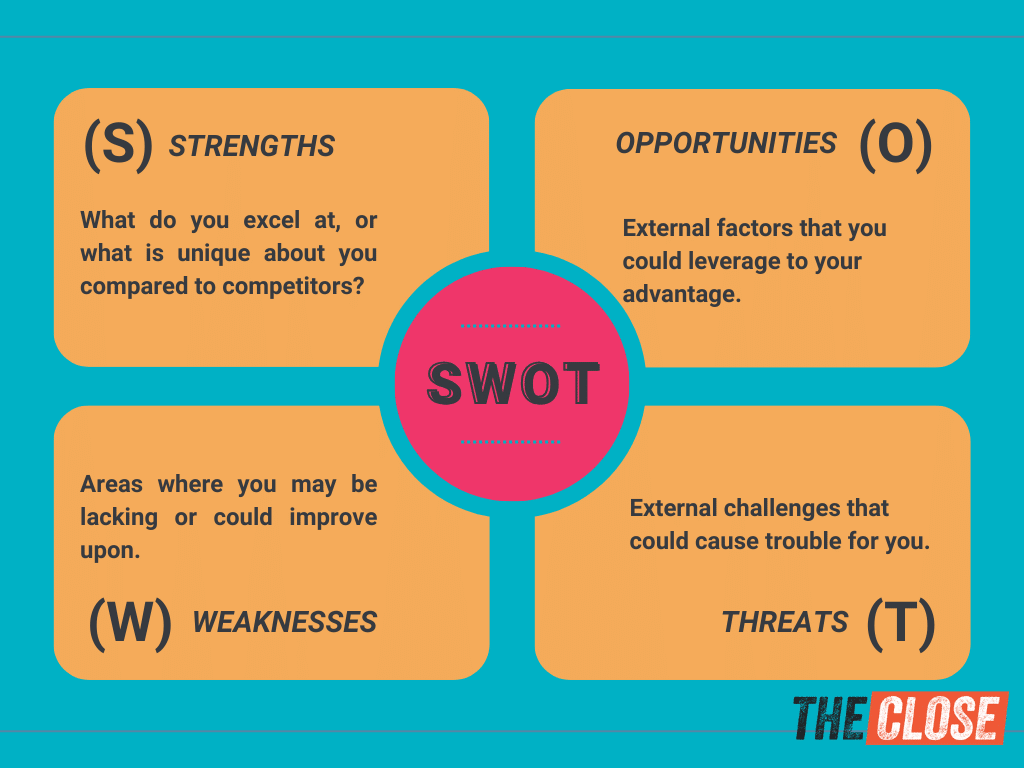
| Strengths | Opportunities |
| What do you slay at? Maybe you’re a master negotiator or have a knack for finding hidden gem properties. Whatever it is, own it and make it the backbone of your strategy. | What’s happening in your market that you can use to your advantage? Is there an untapped niche or a new technology that could help you streamline your business? |
| Weaknesses | Threats |
| We all have weaknesses, so don’t be afraid to admit yours. You may not be the best at staying organized or struggle with marketing. The key is to be honest with yourself and either work on improving those areas or hire someone to help you. | There’s competition out there, but don’t let that keep you up at night. Instead of obsessing over what other agents are doing, focus on your game plan and stick to it. Identifying threats means recognizing things outside your control that could hinder your success, like the slowing real estate market or limited inventory. |
By conducting a SWOT analysis as part of your real estate business plan, you’ll have a clear picture of your current situation and your future goals. And don’t just do it once and forget about it—review and update it regularly to stay on top of your game.
5. Establish Your SMART Goals
If you want to make it big in real estate, setting goals is an absolute must. But not just any goals—I’m talking about SMART goals. SMART stands for Specific, Measurable, Achievable, Relevant, and Time-bound. It’s like a recipe for success, ensuring your goals are clear, realistic, and have a deadline.
Your SMART goals are an integral part of your overall business plan for real estate. They should be stepping stones to help you achieve your long-term vision and mission. So, analyze your SWOT analysis, ideal client, and market, and craft goals that will help you dominate your niche.
Example Smart Goal: Close 10 transactions in the next quarter.
Specific
Make sure to provide as many details as possible behind your goals. Don’t just say, “I want to sell more houses.” That’s too vague. In the example above, the goal is specific: “close 10 transactions.”
Measure
If you can’t measure your progress, how will you know if you’re crushing it or falling behind? Ensure your goals have numbers attached to track your success or see where you need to focus more energy. “Close 10 transactions” has a specific number, so you have a way to measure your progress.
Achievable
I know you’ve got big dreams for your real estate business, but Rome wasn’t built in a day. Set goals that stretch you beyond your comfort zone but are still achievable. This way, you’ll gain confidence, build momentum, and push yourself to new heights. Closing 10 transactions in a quarter is a lofty goal, but it’s still achievable. Your goals should stretch you but still be within your reach.
Relevant
Relevant goals are the ones that actually move the needle for your business. Sure, becoming the next TikTok sensation might be a lot of fun, but unless TikTok generates most of your clients, it won’t help you close more deals. Your goals should be laser-focused on the activities and milestones that will help you grow your real estate career. In the example above, the goal is specifically related to real estate.
Time-bound
Deadlines are your friend. Without a timeline, your goals are just wishes. Give yourself a precise end date and work backward to create a plan of action. In the example, the deadline for achieving the goal is the end of the current quarter. If you don’t achieve the goal, you can evaluate where the shortfall was and reset for the next quarter.
“Setting goals is the first step in turning the invisible into the visible.”

Remember, just like your SWOT analysis, your goals aren’t set in stone. Review and adjust them regularly to stay on track and adapt to business and market changes.
6. Create Your Financial Plan
Financial planning might not be your idea of a good time, but this is where your real estate business plan really comes together. Thanks to all the research and strategizing you’ve done, most of the heavy lifting is already done. Now, it’s just a matter of plugging in the numbers and ensuring everything adds up.
In this real estate business plan template section, you’ll want to account for all your operating expenses. That means everything from your marketing budget to your lead generation costs. Don’t forget about the little things (like printer ink, file folders, thank you cards, etc.)—they might seem small, but they can add up quickly. Some typical expenses to consider include:
- Marketing and advertising (business cards, website, social media ads)
- Lead generation (online leads, referral fees, networking events)
- Office supplies and equipment (computer, printer, software subscriptions)
- Transportation (gas, car maintenance, parking)
- Professional development (training, courses, conferences)
- Dues and memberships (MLS fees, association dues)
- Insurance (errors and omissions, general liability)
- Taxes and licenses (business licenses, self-employment taxes)
Once you’ve figured out your expenses, it’s time to reverse-engineer the numbers and determine how many deals you need to close each month to cover your costs. If you’re just starting out and don’t have a track record to go off of, no worries! This planning period allows you to set a budget and create a roadmap for success.
Pro tip: Keep your personal and business finances separate. Never dip into your personal cash for business expenses. Not only will it make tax time a nightmare, but it’s way too easy to blow your budget without even realizing it.
If you’re evaluating your starting assets and realizing they don’t quite match your startup costs, don’t panic. This new insight is just a sign that you must return to the drawing board and tweak your strategy until the numbers line up. It might take some trial and error, but getting your financial plan right from the start is worth it.
7. Track Your Progress & Adjust as Needed
You’ve worked hard and created a killer real estate business plan, and you’re ready to take on the world. But remember, your business plan isn’t a one-and-done deal. It’s a living, breathing document that needs to evolve as your business grows and changes. That’s why it’s so important to track your progress and make adjustments along the way.
Here are a few key things to keep in mind:
- Set regular check-ins: Schedule dedicated time to review your progress and see how you’re doing against your goals, whether weekly, monthly, or quarterly.
- Keep an eye on your KPIs: Your key performance indicators (KPIs) are the metrics that matter most to your business. Things like lead generation, conversion rates, and average sales price can give you a clear picture of your performance.
- Celebrate your wins: When you hit a milestone or crush a goal, take a moment to celebrate. Acknowledging your successes will keep you motivated and energized.
- Don’t be afraid to pivot: If something isn’t working, change course. Your real estate business plan should be flexible enough to accommodate new opportunities and shifting market conditions.
- Stay accountable: Find an accountability partner, join a mastermind group, or work with a coach to help you stay on track and overcome obstacles.
“It’s the small wins on the long journey that we need in order to keep our confidence, joy, and motivation alive.”

Remember, your real estate business plan is your roadmap to success. But even the best-laid plans need to be adjusted from time to time. By tracking your progress, staying flexible, and keeping your eye on the prize, you’ll be well on your way to building the real estate business of your dreams.
FAQs
How do I start a real estate business plan?
Use this step-by-step guide and the downloadable real estate business plan template to map your business goals, finances, and mission. Identify your ideal client so you can target your marketing strategy. Once you’ve completed all the business plan elements, put them into action and watch your real estate business grow.
Is starting a real estate business profitable?
In the most simple terms, absolutely yes! Real estate can be an extremely profitable business if it’s run properly. But you need to have a roadmap to follow to keep track of your spending vs income. It’s easy to lose track of expenses and overextend yourself when you don’t have a set plan.
How do I jump-start my real estate business?
One of the easiest ways to jump-start any business is to set clear goals for yourself. Use this guide and the downloadable template to ensure you have clear, concise, trackable goals to keep you on track.
How do I organize my real estate business?
Start by setting some SMART goals to give yourself a concrete idea of what you see as success. Then, make sure you’re using the right tools—customer relationship manager (CRM), website, digital document signing, digital forms, etc., and make sure you have them easily accessible. Try keeping most of your business running from inside your CRM. It’s much easier to keep everything organized if everything is in one place.
Bringing It All Together
Now, you have a step-by-step guide to creating a real estate business plan that will take your career to the next level. Taking the extra time to map your path to success is an essential step in helping you achieve your goals. Spend the extra time—it’s worth it. Now, it’s time to do the work and make it happen. You’ve got this!
Have you created your real estate business plan? Did I miss any crucial steps? Let me know in the comments!
The post 7 Steps to Writing a Real Estate Business Plan (+ Template) appeared first on The Close.
22 Mar, 2024 | Admin | No Comments
How to Make Money as a Real Estate Agent: 11 Strategies to Earn More

Success in the real estate industry takes serious hustle and grit, no matter what the market is doing. It’s been rough out there lately, but don’t worry—I’ve got your back! I’ll share 11 awesome tips on how to make money as a real estate agent, even when things aren’t exactly booming. From making the most of tech to nurturing those all-important connections, these strategies will give you the tools to build a sustainable business. So, let’s dive in and get you on the path to success!
Key Takeaways
- There are many ways to learn how to make money with a real estate license, including tapping unlikely lead sources.
- Thinking outside the box can help build a multi-spoked real estate business by creating additional income streams in adjacent areas.
- Some real estate niches, like luxury and commercial, are naturally more lucrative than others.
- The best way to make money in real estate is to have great business and marketing plans to give yourself a roadmap toward monetary goals.
1. Leverage Your CRM to Keep Your Sphere Warm
Your sphere of influence is your secret weapon in real estate—and your customer relationship manager (CRM) is the key to unlocking its full potential. By setting up automated campaigns that keep you in touch with your contacts through emails and text messages, you’ll stay top of mind when they’re ready to make a move.
Here are a few ideas:
- Create a targeted email campaign to educate buyers on the benefits of home ownership.
- Write an email campaign that keeps your seller leads current on the latest market trends.
- Send holiday emails, including client birthdays, home purchase anniversaries, National Donut Day, etc., to keep you top of mind with your sphere of influence.
- Send automated quarterly emails to your sphere asking for referrals.
- Create videos to embed in your text messages and emails (try a platform like BombBomb) sharing interesting facts about your town.
- Send text messages to your past clients asking for 5-star reviews.
- Share local events with your database via text and email.
- Create an email newsletter for your database.
- Set up listing alerts for your buyer leads to go out automatically when a new home that matches their criteria hits the market.

With so many great CRM options tailored specifically for real estate agents, you’re sure to find one that fits your needs and budget. Still trying to figure out where to start? Check out our article on the best real estate CRMs to find the perfect fit for your business. Trust me, investing in a solid CRM and putting it to work for you can make all the difference in keeping your pipeline full and your commissions flowing, no matter what the market’s doing.
2. Fill Your Pipeline With Paid Leads
When the market slows down, keeping your pipeline full is crucial—and paid real estate leads can be a game-changer. Whether you’re an individual agent, a team leader, or a broker, there are plenty of ways to keep those leads coming in.
Check out some of my favorite paid lead generation companies:
- Buyer leads: Zillow
- Homesellers: SmartZip
- Digital leads: Zurple
- Affordable leads: zBuyer
- Probate leads: Catalyze AI
These experts know how to target the right people with the right message at the right time, serving up hot leads ready to convert. However, not all paid leads are created equal. To make the most of your investment, be sure to:
- Do your homework and choose a well-reviewed lead generation company.
- Select a company that delivers quality leads that fit your target market.
- Experiment with different lead generation strategies to find what works best for you.
With the right approach and a little bit of hustle, investing in paid leads can be a smart way to keep your business thriving, even when the market’s not cooperating. So, don’t be afraid to explore your options and find the perfect match for your business.
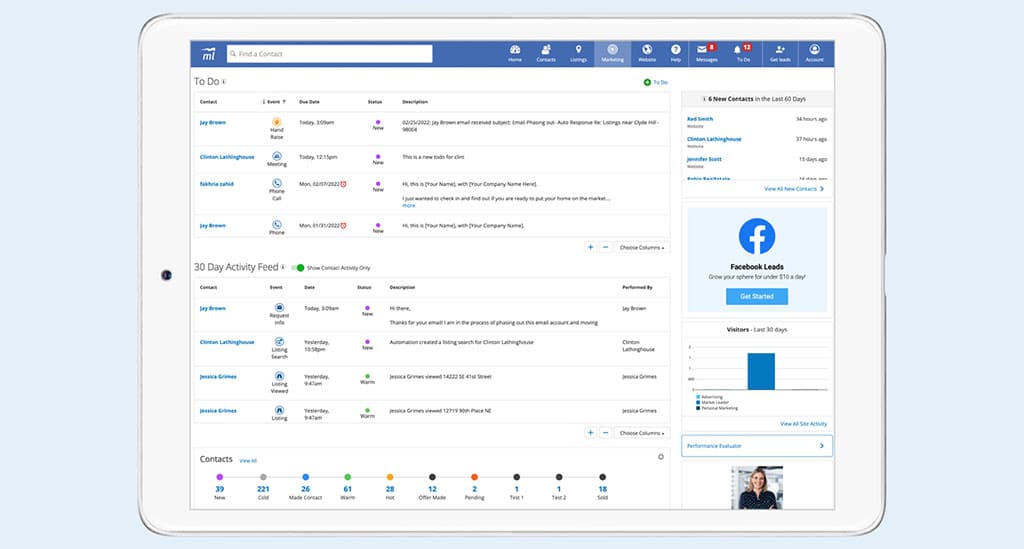
Looking for a powerful CRM that can also generate exclusive leads? Get a predictable number of exclusive and affordable social media leads monthly with Market Leader.
3. Control Your Destiny by Hitting the Phones
In a slow market, it’s easy to feel like success is out of your hands. But one tried-and-true strategy puts you back in the driver’s seat—hitting the phones and cold calling. This tactic is a powerful way to learn how to make money as a real estate agent and land some listings, even when the market is challenging.
Now, I know what you’re thinking—cold calling isn’t exactly the most popular strategy these days. And it’s true—it’s not for everyone. But hear me out! You’re taking control of your productivity and pipeline by reaching out to FSBOs, expireds, your farm, and other potential leads. And with some great cold-calling scripts in hand, your confidence will grow with each new call.

Here’s the thing: When you’re the one making the calls, you’re not waiting for leads to come to you. You’re actively seeking opportunities and starting conversations that can lead to real business. And while it may take some time to learn how to convert leads over the phone effectively, the payoff can be huge.
Of course, cold calling isn’t the easiest way to learn how to make money with a real estate license. It takes persistence, patience, and a willingness to step outside your comfort zone. But if you’re ready to put in the work and learn the skills, cold calling can be a compelling choice to keep your pipeline full and your business thriving, no matter what the market’s doing.
Get started with the right tools. If you’re ready to tackle this cold-calling strategy, REDX delivers fresh leads directly to your fingertips. You can choose which type of leads you want to work with and only pay for what you need. Plus, their built-in dialer saves your finger muscles from all the number-punching.
4. Find Future Buyers by Nurturing Renters
When the market slows down and buyer leads seem scarce, it’s time to get creative. One often-overlooked source of potential buyers? Renters! Targeting renters is a smart strategy when learning how to make money as a real estate salesperson, even when the market is challenging. The people signing leases could be your next big sale. By marketing directly to renters and nurturing their relationships, you can groom them to become your future buyer clients.
Think about it: Renters may not be ready to buy right now, but by staying in touch and providing valuable information about the homebuying process, you’ll be the one they think of when they are ready to take that next step.

So how do you tap into this potential gold mine of leads? Here are a few ideas:
- Offer free resources, like a “Renter’s Guide to Buying a Home” or a “How Much Home Can I Afford?” calculator.
- Host informational seminars or webinars specifically geared toward renters (partner with a lender to get those questions answered).
- Partner with local apartment complexes to provide referral incentives.
- Use targeted social media ads to reach potential renters in your area.
 Pro Tip
Pro Tip
Focusing on renters and building relationships over time will cultivate a pipeline of potential buyer leads without breaking the bank on paid leads. This well-tested method can pay off big when those renters are ready to become homeowners.
5. Build Relationships With Developers
When the market starts to cool and traditional sources of business start to dry up, building relationships with real estate developers and investors can be a lifeline. Here’s the thing: While the average buyer may be tightening their purse strings in a slow market, investors tend to do the opposite. They know that the secret to building real estate wealth is to buy when everyone else is sitting on the sidelines—and they typically have the means or know some hard money lenders to do it.

As Warren Buffett famously said, “Be fearful when others are greedy, and greedy when others are fearful.” When the market is retreating, and everyone else is watching their pennies, that’s when savvy investors are ready to pounce.
So, how can you find real estate investors and tap into this revenue source? It all starts with building relationships. Here are a few ideas:
- Attend local real estate investor meetups and networking events.
- Join online forums and social media groups geared toward developers and investors.
- Offer specialized services, like property management or renovation consulting.
- Provide valuable market insights and data to help investors make informed decisions.
Of course, working with investors isn’t always easy. They can be demanding and may have different priorities than traditional buyers. But if you’re willing to do the work and build those relationships over time, you may just find that investors are the key to keeping your pipeline full and your business growing—and a dynamic way to learn how to make money as a real estate agent.
Need to learn the inside scoop on hard money lenders to share with your investor clients? Check out Kiavi. From bridge loans to fix-and-flip funding, Kiavi uses state-of-the-art tech to streamline the process and make funding easier for investors.
6. Choose a Lucrative Niche
When learning how to make money in real estate, there are plenty of opportunities across all types of properties and markets. But if you’re looking to maximize your earning potential, a few specific areas tend to be more lucrative than others.
Commercial Real Estate
One of the most profitable areas of real estate is commercial property. This niche includes everything from office buildings and retail spaces to warehouses and industrial properties. Commercial real estate deals are larger and more complex than residential transactions, often with higher commissions and fees. Commercial properties often have longer lease terms and more stable tenants, which can provide a steady income stream over time.
However, breaking into the commercial real estate market can be challenging, especially for agents who are used to working with residential clients. In most cases, you’ll need to obtain additional designations, such as the Certified Commercial Investment Member (CCIM) designation, to show your expertise and credibility in the commercial space.
Luxury Real Estate
If commercial real estate isn’t your cup of tea, luxury real estate is another highly profitable area to consider. This market focuses on high-end properties and affluent clients, which can translate to significant commissions and fees. Unlike commercial real estate, you don’t necessarily need additional licenses or designations to break into the luxury market—although pursuing certifications like the Luxury Homes Certification can help establish your credibility and expertise.
One of the biggest advantages of working in the luxury real estate market is that the skills and strategies you’ve developed in residential real estate are highly transferable. You’ll still need to focus on building relationships, providing exceptional client service, and staying up to date on market trends and best practices, but you won’t need to start from scratch regarding your knowledge and experience.
If you’re interested in making the transition from residential to luxury real estate, there are a few key steps you can take to set yourself up for success:
- Educate yourself on the luxury market and the unique needs and preferences of high-end clients.
- Build a strong personal brand and online presence that showcases your expertise and value proposition.
- Network with other luxury agents, brokers, and industry professionals to expand your reach and referral opportunities.
- Develop a targeted marketing strategy that speaks directly to the needs and desires of luxury buyers and sellers.
- Provide exceptional, white-glove service that goes above and beyond what clients expect.
For more detailed guidance on becoming a luxury real estate agent, check out our guide that walks you through the process step-by-step.
And if you’re really ready to level up your real estate business, explore the gorg website designs of Luxury Presence. If you’re competing with other luxury real estate pros, you’ll need a site that can keep up. Your image is important in the luxury game, and you’ll need high-end branding. Luxury Presence is an all-in-one platform that manages your online presence with stunning websites that generate leads to help you get your sophisticated brand out in front of all the right eyeballs.
Ultimately, the type of real estate that makes the most money will depend on your unique skills, interests, and market opportunities. Whether you specialize in commercial, luxury, or another niche market, the key is continuously educating yourself, building your network, and providing exceptional value to your clients. With the right strategy and mindset, you can build a highly profitable and rewarding career in any area of real estate.
7. Identify an Underserved Niche
When the competition is fierce and the market is slow, it’s time to get specific. One of the smartest strategies for standing out and generating leads is identifying an underserved real estate niche in your market and becoming the go-to expert in that area. If you want to know how to make money in real estate agent niches, this is how to do it.
Now, you might be thinking—won’t narrowing my focus limit my potential business? But the truth is, the smaller your niche, the more targeted (and effective) your marketing efforts can be. By honing in on a specific group of buyers or sellers, you can tailor your messaging, build deeper relationships, and establish yourself as the authority in that space.

So, what are some potential real estate niches to explore? Here are just a few examples:
- Probate
- REO (Real estate owned)
- Military relocation specialist
- Vacant land
- Agricultural
- Divorce and probate
- Senior living
- Investors
Keep in mind that not every niche will be a fit for every market. While military housing might be an ample opportunity in some areas, it may not be relevant in others. And beachfront condos might be a hot commodity in coastal towns, but they’re probably not a factor in inland cities.
The key is to identify a niche that aligns with your market and expertise and then go all-in on becoming the best in that space. Focus all your marketing efforts around that niche, from your website and social media presence to your networking and referral strategies. By doing so, you’ll be well on your way to answering questions about how to make money as a realtor.
And don’t be afraid to get ultra-specific. For example, instead of focusing on “farmhouses,” you might specialize in “horse farms or equestrian facilities from 5 to 25 acres.” The more targeted your niche, the easier it will be to establish yourself as the go-to resource for that group.
8. Become the Expert Other Agents Turn To
One real estate side hustle that offers multiple benefits is becoming the agent other agents turn to for advice and expertise. By positioning yourself as a leader and educator in your industry, you’ll attract more buyers and sellers and create opportunities to monetize your knowledge.
Here’s how:
- Start by centering your marketing efforts on teaching other agents how to build their businesses.
- Share your insights, strategies, and best practices through blog posts, social media content, and online courses.
- Create digital tools and resources that other agents find valuable, like checklists, templates, and downloadable guides.
- Capture the email addresses of agents who download your tools so you can continue to market to them.
- If you have design skills, consider creating digital products to sell online (think Etsy).
- Look into becoming a faculty member with your state association to teach agents CE credit courses to maintain their licenses.
- Share your knowledge on a larger platform by becoming a freelance writer for real estate publications like TheClose.com or realtor.com.
By monetizing your expertise in this way, you can create a lucrative side hustle that complements your core real estate business.

Becoming a real estate expert other agents turn to takes time, effort, and consistency to build your reputation and establish yourself as a thought leader. But the payoff can be huge—not just in generating leads and closing deals but also in creating additional revenue streams that can help you ride out any market.
9. Manage Properties That Don’t Sell
As a real estate agent, you’ve probably encountered this scenario before: You’ve listed a property for a client, but due to circumstances beyond their control (like a military relocation), they must move before the home sells. While this can be frustrating for everyone involved, it also presents a unique opportunity for you to expand your services and generate additional revenue.
One smart strategy is to offer to manage the property for your client as a rental. By taking on the role of property manager, you can help your client avoid the stress and hassle of dealing with tenants and maintenance issues from afar—all while creating a new income stream for your business.
Of course, before you start offering property management services, there are a few key things to remember. Check with your broker to ensure that your brokerage is set up to manage properties and that you follow all in-house rules and regulations. In some states (like Florida), you may need a broker’s license to manage rental properties for others legally, so be sure to do your due diligence and comply with all relevant laws and regulations.
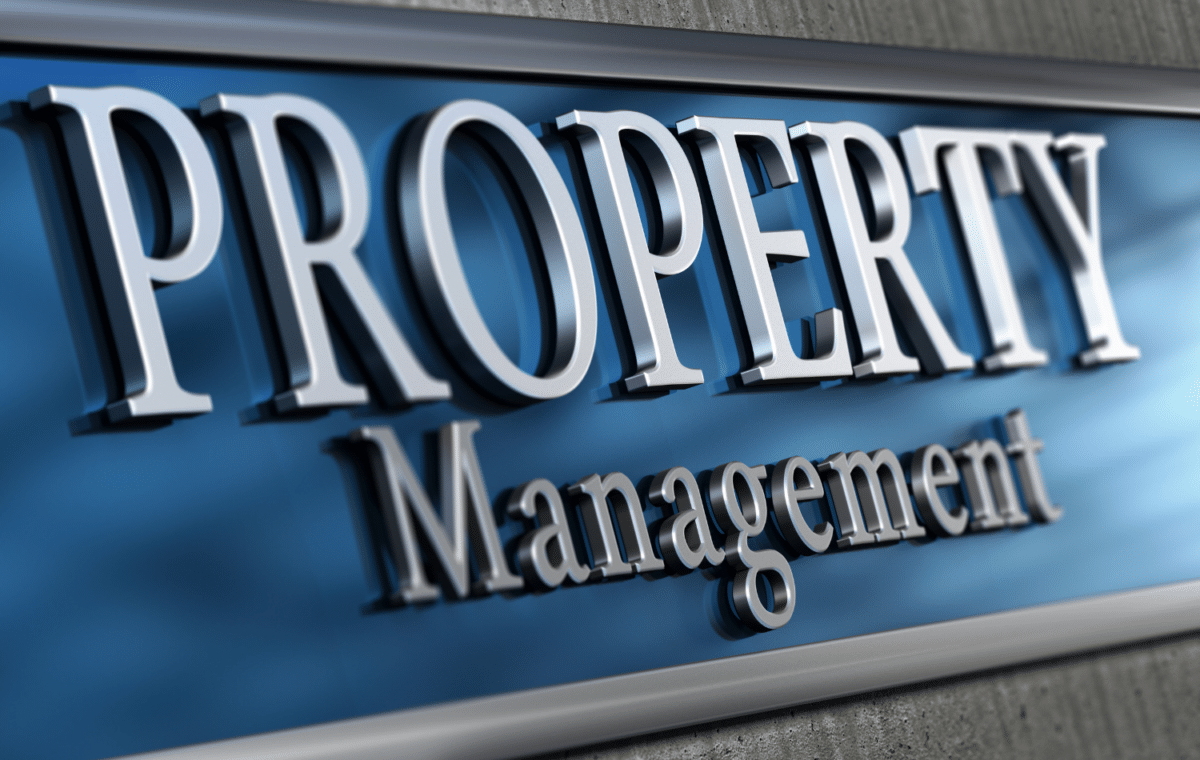
Assuming you’re able to move forward with property management, there are a few best practices to keep in mind:
- Communicate clearly with your client about your fees, services, and expectations.
- Screen tenants carefully to ensure a good fit and minimize turnover.
- Stay on top of maintenance and repair issues to keep the property in top condition.
- Keep detailed records of all income and expenses for tax purposes.
By offering property management services, you can provide a valuable solution for clients whose homes don’t sell right away—and create a lucrative new revenue stream for your business in the process. And who knows? You may even discover a passion for property management, leading to a new career path.
10. Create a Solid Business Plan
One of the biggest mistakes new agents make is assuming that simply having an active real estate license is enough to start raking in the dough. In reality, success in real estate requires a clear plan and a strategic approach. That’s where a clearly defined business plan and marketing plan come in.
Your business plan should outline your goals, target market, unique value proposition, and financial projections. It should also include a detailed budget for marketing, technology, and continuing education expenses. By treating your real estate career like a business from day one, you’ll be better equipped to make smart decisions and invest in the right tools and resources to help you grow.
Your marketing plan, on the other hand, should focus on how you’ll attract and retain clients. This plan might include tactics like:
- Building a strong online presence through a professional website and social media profiles.
- Networking with other local businesses and community organizations.
- Developing a niche or specialty to differentiate yourself from competitors.
- Creating valuable content (like blog posts or videos) to establish yourself as a thought leader.
- Leveraging email marketing and other outreach strategies to stay top-of-mind with past and potential clients.
By creating a comprehensive marketing plan and executing it consistently, you’ll be able to generate a steady stream of leads and build a reputation as a go-to agent in your market.
So, how do you make money as a real estate agent? It certainly takes effort and strategic planning. But for those willing to treat their real estate career like a business and work to build a strong foundation, the rewards can be life-changing.
11. Manage Expectations Based on Your Specific Market
Many agents set a goal of making six figures, but the path to achieving it can look different for everyone. There’s no one-size-fits-all formula on how to make money as a real estate agent—instead, it’s about understanding your market, setting clear goals, and consistently taking action to move the needle forward.
One of the first things to consider when aiming for a six-figure income is your market and niche. Real estate agent salaries vary from one market to another. In some areas, selling a single multi-million-dollar property could be enough to generate a six-figure commission. In others, you may need to sell a dozen or more homes at a lower price to achieve the same goal. Understanding your market and the types of properties and clients you want to work with is key to creating a realistic and achievable plan for success.
Set Concrete Goals
Once you clearly understand your market and niche, it’s time to set some concrete goals. This phase is where reverse engineering comes in. Start with your ultimate goal (e.g., making six figures in a year) and work backward to determine what you need to do each month, week, and day to get there. For example, if you know you need to sell 12 homes at an average price of $300,000 to make six figures, you can break that down into monthly, weekly, and daily targets for prospecting, setting appointments, and closings.
Learn to Convert Leads
But setting goals is only part of the equation—you also need the skills and strategies to achieve them. One of the most important skills for any real estate agent is the ability to convert leads into clients. This ability means mastering the art of asking leading questions, handling objections, and turning “no’s” into “yeses.” Any time you invest in learning and practicing these skills is time well-spent, as it can directly impact your ability to generate more business and close more deals.
In addition to lead conversion skills, there are a few other real estate agent tips that can help you achieve a six-figure income as a real estate agent:
- Build a strong personal brand and online presence to attract more leads and referrals.
- Focus on providing exceptional client service to generate repeat and referral business.
- Continually invest in your education and professional development to stay ahead of market trends and best practices.
- Leverage technology and automation to streamline your business and free up more time for revenue-generating activities.
- Surround yourself with a supportive network of colleagues, mentors, and industry experts who can provide guidance and accountability.
Ultimately, making a six-figure gross commission income (GCI) as a real estate agent is about setting clear goals, developing the skills and strategies to achieve them, and consistently taking action toward your vision. It’s not easy—but with hard work, persistence, and a willingness to continuously learn and adapt, it’s an achievable goal for any agent committed to success in the industry.
FAQs
Is it hard to make money as a real estate agent?
Let’s be honest—starting a career as a real estate agent is a lot like starting your own business. It takes hard work, dedication, and a willingness to put in the time and effort to build your brand and client base. So, how do you make money as a realtor? For those who treat their real estate career like a true business venture, the rewards can be significant—both financially and personally.
Is being a real estate agent a good side hustle?
This question is tricky to answer. Success working as a part-time real estate agent depends on various factors, including your current work situation, goals, and commitment to building a successful real estate business. There are pros and cons to being a real estate agent, especially part-time.
On the one hand, pursuing real estate as a side hustle while working a full-time job can be incredibly challenging. Real estate is a demanding field that requires significant time, energy, and resources—especially when working with clients. So, you’ll want to carefully consider whether working part time in real estate will work for you.
Your Take
How to make money as a real estate agent is a big question. Many roads lead to a lucrative real estate business. This list is just the tip of the iceberg. The trick is there is no trick—you can achieve as much success as you’re willing to work for. The beautiful thing about real estate is you can make it into anything you want. Whether you want to become a coach, a real estate investor, a template designer, or the most successful luxury agent in your market, the world is your oyster. But first, be sure to set clear goals so you’ll have a roadmap to get where you want to go.
Do you have a cool real estate money-making secret? How are you designing your real estate empire? I’d love to hear about it in the comments!
The post How to Make Money as a Real Estate Agent: 11 Strategies to Earn More appeared first on The Close.


